SWEDISH
SOUTH ASIAN STUDIES NETWORK
Newsletter 125:
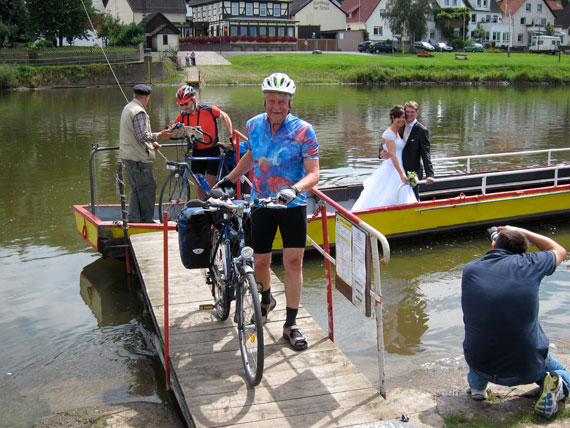 12 August 2011
12 August 2011
| Educational News |
| Lectures and seminars |
| Business and Politics |
| South Asia related Culture |
| New and updated information |
• 27 young scholars meet senior researchers at third Falsterbo conference
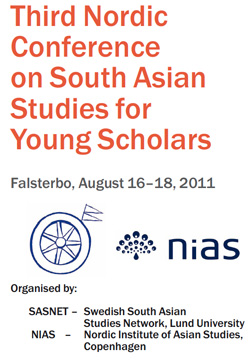 The third Nordic Conference on South Asian Studies for Young Scholars takes place 16–18 August 2011 at Falsterbo kursgård in Höllviken, 20 km south of Malmö. It is organised by SASNET in collaboration with the Nordic Institute of Asian Studies (NIAS). Julia Velkova from SASNET is the main coordinator.
The third Nordic Conference on South Asian Studies for Young Scholars takes place 16–18 August 2011 at Falsterbo kursgård in Höllviken, 20 km south of Malmö. It is organised by SASNET in collaboration with the Nordic Institute of Asian Studies (NIAS). Julia Velkova from SASNET is the main coordinator.
The conference will be a gathering of graduate students and postdocs, along with other junior scholars affiliated with universities in Denmark, Finland, Norway, and Sweden, who are focusing on South Asia in their work. This year a few students from other European countries have also been invited.
 Besides altogether 27 young scholars, the conference also includes 15 senior scholars working with South Asia related research in different fields, giving lectures and acting as respondents in the four panel sessions. The keynote speaker, Professor Patricia Jeffery (photo) from the Dept. of Sociology, School of Social and Political Science,
University of Edinburgh, UK, is one of them. Her presentation is entitled ”Daughter Aversion, Dowry and Demographic Change”. Prof. Jeffery will also take part as champion in a challengers-champions session on Gender, as well as will be a group leader in the thematic group on Gender.
Besides altogether 27 young scholars, the conference also includes 15 senior scholars working with South Asia related research in different fields, giving lectures and acting as respondents in the four panel sessions. The keynote speaker, Professor Patricia Jeffery (photo) from the Dept. of Sociology, School of Social and Political Science,
University of Edinburgh, UK, is one of them. Her presentation is entitled ”Daughter Aversion, Dowry and Demographic Change”. Prof. Jeffery will also take part as champion in a challengers-champions session on Gender, as well as will be a group leader in the thematic group on Gender.
The conference is interdisciplinary and has separate panels on – Gender Issues; – Climate Change/Water Issues; – Mapping the Mental Landscape of Eurasia; and – Alternative Career Paths beyond the Academia. Invited speakers include Professor Ummu Salma Bava, Jawaharlal Nehru University, India; Professor Jussi Kauhanen, Director for Nordic Centre in India(NCI); Professor Abul Mandal, Skövde University; Mr. Kyrre Lind, President, Doctors Wihout Borders Norway; and Ms. Christina Nilsson, International Workgroup for Indigenous Affairs
(IWGIA), Copenhagen.
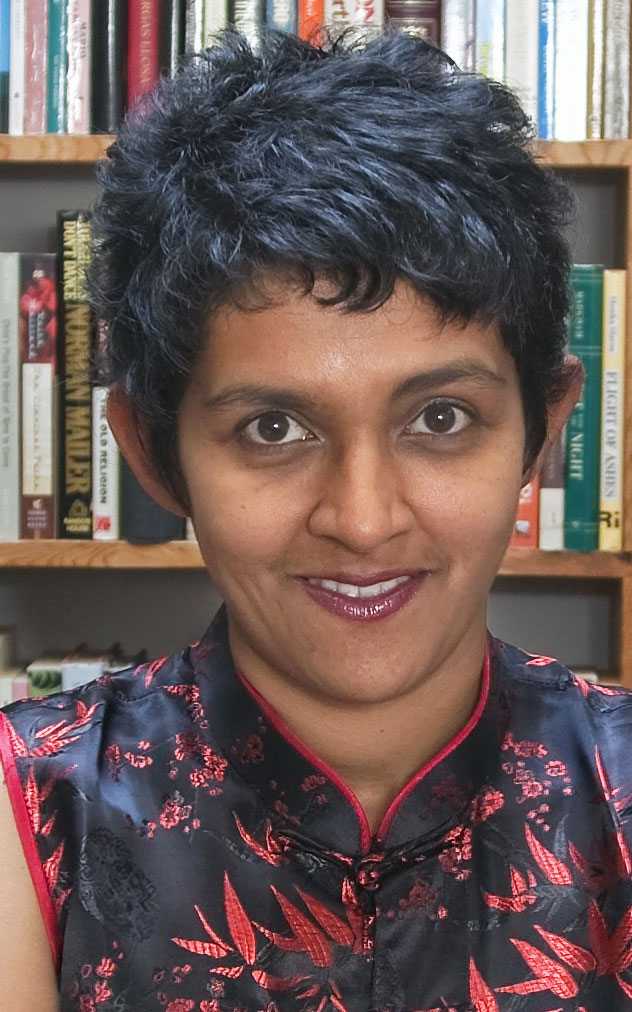 The conference also includes a cultural programme, consisitng of a poetic reading by Pireeni Sundaralingam (photo). She will read out excerpts from the recently published volume Indivisible: An Anthology of Contemporary South
Asian American Poetry, co-edited by Pireeni.
Born in Sri Lanka and raised both there and in
the UK, Sundaralingam currently lives in San
Francisco, California, USA. She was performing at a SASNET event at Lund University already in 2006.
The conference also includes a cultural programme, consisitng of a poetic reading by Pireeni Sundaralingam (photo). She will read out excerpts from the recently published volume Indivisible: An Anthology of Contemporary South
Asian American Poetry, co-edited by Pireeni.
Born in Sri Lanka and raised both there and in
the UK, Sundaralingam currently lives in San
Francisco, California, USA. She was performing at a SASNET event at Lund University already in 2006.
For more information, visit the conference website.
See the conference folder (as a pdf-file)
• Strategy Report handed over to Lund University Vice Chancellor
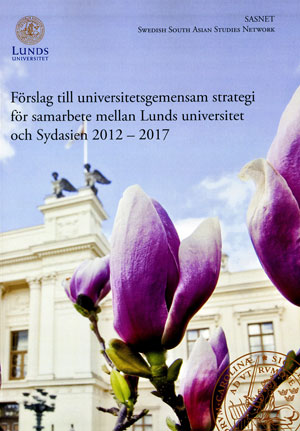 On 30th June 2011, SASNET’s director Anna Lindberg handed over the report she has prepared on Lund University’s common and long-term strategies on South Asia collaboration during the coming five years to the Lund University Vice Chancellor Professor Per Eriksson.
On 30th June 2011, SASNET’s director Anna Lindberg handed over the report she has prepared on Lund University’s common and long-term strategies on South Asia collaboration during the coming five years to the Lund University Vice Chancellor Professor Per Eriksson.
The report has been written in close consultation with
representatives of all faculties at Lund University and
the university’s External Relations division.
When Lund University in March 2010 decided to give additional funding to SASNET, in order to partly compensate for lost funding from the Swedish International Development Cooperation Agency (Sida), the additional subsidy came from the Lund University Vice-Chancellor’s strategic research funds. In the decision to do this, it was clearly stated that the extra funds should be earmarked to prepare a Lund University report on common and long-term strategy for collaboration with South Asia.
The mission from the Vice Chancellor also included exploring possibilities to find external collaboration partners and secure new external funding for SASNET’s continued South Asia-related activities, and a time limit was set to end-June 2011. The task has been carried out by Anna Lindberg with input from SASNET’s deputy director Lars Eklund, and Mr Henrik Hofvendahl, International Programme Officer at the International Relations division, Lund University.
• SASNET coordinates Tagore 150th birth anniversary seminars in Scandinavia
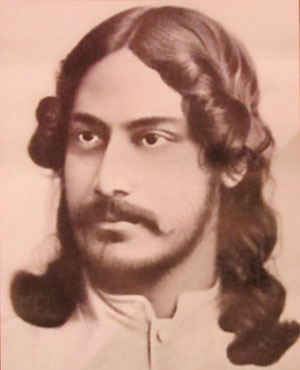 SASNET again organises a Rabindranath Tagore 150th birth anniversary celebration week 19–23 September 2011. The celebration includes academic seminars in Copenhagen (19th), Lund (21st), Stockholm (22nd) and Uppsala (23rd).
SASNET again organises a Rabindranath Tagore 150th birth anniversary celebration week 19–23 September 2011. The celebration includes academic seminars in Copenhagen (19th), Lund (21st), Stockholm (22nd) and Uppsala (23rd).
SASNET is strongly involved in planning for these academic seminars and related cultural programmes that are organised
in collaboration with the Indian embassies in Copenhagen and Stockholm, and with support from the Indian Council for Cultural Relations (ICCR). Invited scholars include Professor William Radice, SOAS, University of London; Dr. Reba Som, Director, ICCR Rabindranath Tagore Centre in
Kolkata; and Professor Asoke Bhattacharya, Jadavpur University, Kolkata. The seminar at Lund University will be held on Wednesday 21 September, 09.00–13.00, at Stadshallen in central Lund.
See the full programme for the Lund seminar.
Detailed programme for the other seminars will be posted soon.
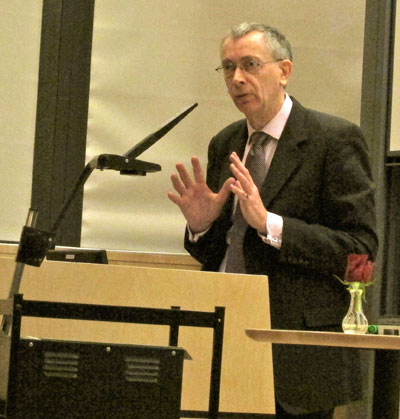 SASNET organised a Tagore week in Lund already 20–24 March 2011. In collaboration with other local institutions and organisations, the week-long programme included a fulll-day academic seminar featuring Professor Wiliam Radice (photo); Associate Professor Claes-Göran Homberg and other invited speakers, but also exhibitions, concerts, film shows, poetry reading and popular lectures by Swedish experts on Rabindranath’s life and literature, such as Dr. Olavi Hemmilä and Mr. P O Henricson. The programme even included a Sunday evening mass in Lund Cathedral where the choir Svart på Vitt performed the song ”Ontoro Momo” by Tagore in Bengali language.
SASNET organised a Tagore week in Lund already 20–24 March 2011. In collaboration with other local institutions and organisations, the week-long programme included a fulll-day academic seminar featuring Professor Wiliam Radice (photo); Associate Professor Claes-Göran Homberg and other invited speakers, but also exhibitions, concerts, film shows, poetry reading and popular lectures by Swedish experts on Rabindranath’s life and literature, such as Dr. Olavi Hemmilä and Mr. P O Henricson. The programme even included a Sunday evening mass in Lund Cathedral where the choir Svart på Vitt performed the song ”Ontoro Momo” by Tagore in Bengali language.
Detailed information about the Lund Tagore Week.
• Malin Gregersen holds 15th September SASNET Brown bag seminar
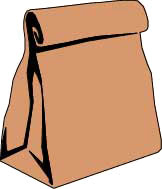 In January 2011, SASNET launched an Interdisciplinary South Asia Seminar series at Lund University, in the form of Brown bag lunch seminars. The aim is to present and disseminate the eminent South Asia related research that is carried out in so many departments at Lund University.
The seminars are open to the public, and during the fall 2011 they will be held once a month at Thursdays at Murbeckssalen, Gula Vilan (inside the Botanical Gardens) Lund.
In January 2011, SASNET launched an Interdisciplinary South Asia Seminar series at Lund University, in the form of Brown bag lunch seminars. The aim is to present and disseminate the eminent South Asia related research that is carried out in so many departments at Lund University.
The seminars are open to the public, and during the fall 2011 they will be held once a month at Thursdays at Murbeckssalen, Gula Vilan (inside the Botanical Gardens) Lund.
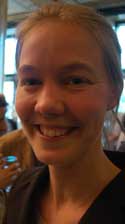 The first seminar will be held on 15th September 2011. Dr. Malin Gregersen (photo) from the Department of History will give a presentation entitled ”Fostering Obligations: Swedish Medical Missionary Narratives from South India”. Malin defended her doctoral dissertation on this issue as recently as a year ago.
The first seminar will be held on 15th September 2011. Dr. Malin Gregersen (photo) from the Department of History will give a presentation entitled ”Fostering Obligations: Swedish Medical Missionary Narratives from South India”. Malin defended her doctoral dissertation on this issue as recently as a year ago.
Later follows on 13th October, Associate Professor Åsa Ljungh from the Section of Medical Microbiology, Department of Laboratory Medicine, and on 10th November, Dr. Olle Frödin from the Department of Sociology.
More information about the seminar series.
• 119 SASNET networking grants distributed 2001–2009
During the period 2001–2009, SASNET distributed planning grants to new research and educational projects. A total number of 119 networking grants were distributed to Swedish researchers working on South Asia related projects within all fields – from technology and natural sciences to humanities, social sciences and educational sciences. The researchers who benefited from the grants belonged to 20 different Swedish universities and university colleges. Out of the 119 grants awarded, 72 referred to networking grants to plan for new research projects/programmes; 20 to grants in order to develop new educational projects/programmes; 10 to organise interdisciplinary workshops; and 17 to the guest lecture programme. Go for the complete list of SASNET planning grants distributed 2001–2009.
In the evaluation of SASNET that was carried out in 2005 (go for the evaluation report), it was shown that 70 p.c. of the projects that had been given SASNET planning grants till 2004 had later been given substantial funding from other sources, such as Sida/SAREC, Swedish Research Council, Bank of Sweden Tercentennary Fund, and the European Commission. Also thereafter, SASNET’s networking grants continued to play an important role setting new South Asia related projects/programmes in motion.
No planning grants have been distributed after 2009.
• JNU researcher visited SASNET’s office in Lund
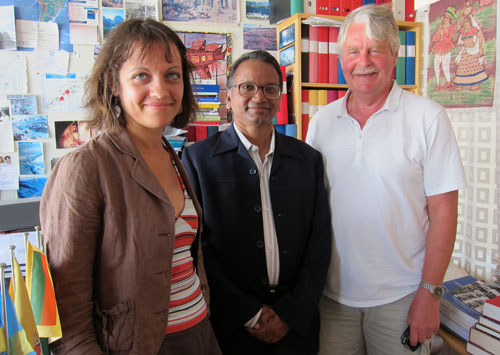 On 4 August 2011, Dr. Y. S. Alone, Assistant Professor at the
School of Arts and Aesthetics,
Jawaharlal Nehru University (JNU) in New Delhi, India, visited SASNET’s office at Lund University. Dr. Alone who is basically an art historian and studies Buddhism in western India, had come to Sweden to participate in the 2011 Nordic Summer University (NSU) symposium on ”Narrativity and Political Imaginaries” held at Falsterbo, south of Malmö, 31 July – 6 August 2011, and more specifically the NSU symposium’s study circle focusing on ”Psychoanalysis and Politics”. He presented an opening address entited ”Confronting Political Representation: Politics of Visuality”, focusing on the relation between Gandhi and Ambedkar in the Indian freedom struggle.
More information about the 2011 NSU symposium at Falsterbo.
On 4 August 2011, Dr. Y. S. Alone, Assistant Professor at the
School of Arts and Aesthetics,
Jawaharlal Nehru University (JNU) in New Delhi, India, visited SASNET’s office at Lund University. Dr. Alone who is basically an art historian and studies Buddhism in western India, had come to Sweden to participate in the 2011 Nordic Summer University (NSU) symposium on ”Narrativity and Political Imaginaries” held at Falsterbo, south of Malmö, 31 July – 6 August 2011, and more specifically the NSU symposium’s study circle focusing on ”Psychoanalysis and Politics”. He presented an opening address entited ”Confronting Political Representation: Politics of Visuality”, focusing on the relation between Gandhi and Ambedkar in the Indian freedom struggle.
More information about the 2011 NSU symposium at Falsterbo.
At SASNET, Dr. Alone had a fruitful interaction with deputy director Lars Eklund and assistant webmaster Julia Velkova (seen on the photo along with Dr. Alone).
He also met Dr. Jan Magnusson from the School of Social Work, Lund University.
• Pune University Vice Chancellor visited Lund and Stockholm
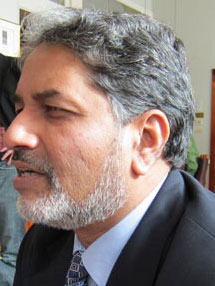 On 21 June 2011, Anna Lindberg and Lars Eklund from SASNET had a fruitful meeting in Lund with Vice Chancellor Professor K R Shevgaonkar (photo) and Dr. Prasad Kulkarni from the University of Pune, India. They have come to Sweden in order to visit two of their partner universities, namely Lund University and KTH Royal Institute of Technology in Stockholm and Lund University, both of which are involved in Indo-European Erasmus Mundus Action 2 programmes with University of Pune. Prof. Shevgaonkar recently took over as the Vice Chancellor of University of Pune. Before that he was attached to the Indian Institute of Technology (IIT) Bombay for many years.
On 21 June 2011, Anna Lindberg and Lars Eklund from SASNET had a fruitful meeting in Lund with Vice Chancellor Professor K R Shevgaonkar (photo) and Dr. Prasad Kulkarni from the University of Pune, India. They have come to Sweden in order to visit two of their partner universities, namely Lund University and KTH Royal Institute of Technology in Stockholm and Lund University, both of which are involved in Indo-European Erasmus Mundus Action 2 programmes with University of Pune. Prof. Shevgaonkar recently took over as the Vice Chancellor of University of Pune. Before that he was attached to the Indian Institute of Technology (IIT) Bombay for many years.
More information about Prof. Shevgaonkars’s visit to Sweden.
• Fruitful interaction with researchers at IHCAR/Karolinska Institutet
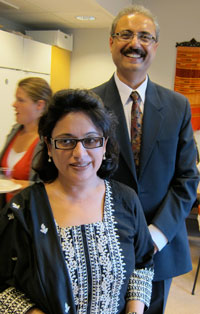 On 15 June 2011, SASNET’s deputy director Lars Eklund visited the Division of Global health
(IHCAR) at Karolinska Institutet Medical University in Stockholm. The main purpose was to attend the PhD dissertation by Mr. Mohsin Saeed Khan, who successfully defended his thesis entitled ”Poverty of Opportunity for Women Selling Sex in Lahore, Pakistan: Knowledge, Experiences and Magnitude of HIV and STIs”. Mohsin has been a member of SASNET’s South Asian Reference Group. More information.
On 15 June 2011, SASNET’s deputy director Lars Eklund visited the Division of Global health
(IHCAR) at Karolinska Institutet Medical University in Stockholm. The main purpose was to attend the PhD dissertation by Mr. Mohsin Saeed Khan, who successfully defended his thesis entitled ”Poverty of Opportunity for Women Selling Sex in Lahore, Pakistan: Knowledge, Experiences and Magnitude of HIV and STIs”. Mohsin has been a member of SASNET’s South Asian Reference Group. More information.
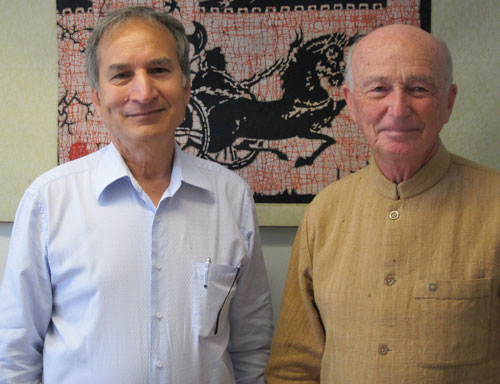 While at IHCAR, Lars also interacted with a large number of other researchers – professors, post-docs and PhD candidates in Global Health, including Dr. Fauzia Rabbani, now back at Aga Khan University in Karachi (photo to the left, with Mohsin).
While at IHCAR, Lars also interacted with a large number of other researchers – professors, post-docs and PhD candidates in Global Health, including Dr. Fauzia Rabbani, now back at Aga Khan University in Karachi (photo to the left, with Mohsin).
A separate meeting was held with Professor Vinod Diwan and Professor Emeritus Bo Lindblad (photo to the right), discussing IHCAR’s long-standing collaboration with universities in India and Pakistan, the large number of sandwich PhDs attained in recent years, and the impressing number of large EU grants for research projects, partly focusing on South Asia, that IHCAR
administers.
• More information about SASNET and its
activities
See SASNET’s page, http://www.sasnet.lu.se/sasnet.html
• Swedish Research Links grants for coming three years now announced
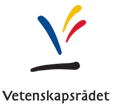 In early July 2011, a new announcement was published for the Swedish Research Links programme. Swedish Research Links grants were introduced
by the Swedish International Development Cooperation Agency (Sida), and the Swedish
Research Council in 2002, with an aim to stimulate
cooperation between researchers in Sweden and those in selected developing countries, including Bangladesh, India and Sri Lanka in South Asia (see SASNET’s information about South Asia related grants from 2002-2009).
In early July 2011, a new announcement was published for the Swedish Research Links programme. Swedish Research Links grants were introduced
by the Swedish International Development Cooperation Agency (Sida), and the Swedish
Research Council in 2002, with an aim to stimulate
cooperation between researchers in Sweden and those in selected developing countries, including Bangladesh, India and Sri Lanka in South Asia (see SASNET’s information about South Asia related grants from 2002-2009).
The long-term aim of the programme is to contribute to mutual scientific and socioeconomic development of the countries involved through funding for support to collaborative research projects of high scientific quality and mutual relevance. The programme is open to researchers in basic and applied research within all academic disciplines. International Collaborative Grants are awarded for a period up to three years, and the maximum amount to apply for is SEK 250,000 a year.
The grant can be used to cover joint activities, such as research visits between the partners, seminars, workshops and joint publishing. Minor project costs may also be funded at a maximum of SEK 50,000. The grant may not be used for salaries and scholarships.
Deadline for submitting applications is Tuesday 6 September 2011.
Read the announcement for Swedish Research Links programme 2012-14.
 • Linnaeus Palme programme grants to South Asia collaboration projects
• Linnaeus Palme programme grants to South Asia collaboration projects
On 11 March 2011, decisions
were taken about Linnaeus Palme exchange programme grants
for 2011-12.
The eleventh round of applications for Linnaeus Palme grants,
for the contract period 1 July 2011 –
30 June 2012, were decided upon by the Swedish International Programme
Office for Education and Training. Out of 240
projects given grants, 27 refer to collaboration with universities in South Asia (Bangladesh 4, India 16, Nepal 2, Pakistan 1, and Sri Lanka 4). Fifteen Swedish universities are involved in collaboration with South Asian universities. Umeå University administers four projects; Karolinska Institutet and Royal Institute of Technology (KTH) three each; University of Gothenburg, Gävle University, Karlstad University, Malmö University and Uppsala University two each. Other Swedish universities with South Asia projects 2012-13 are Gotland, Jönköping, KristianstadLinköping, Mälardalen, Skövde and Stockholm (one each).
Go
for the full list of Linnaeus Palme grants 2011 (as a pdf-file).
See
separate SASNET list on South Asia related projects.
• Uppsala University establishes Forum for South Asian Studies
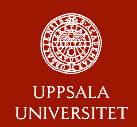 On 9 June 2011, Områdesnämnden för humaniora och samhällsvetenskap at Uppsala University decided to establish a Forum for South Asian Studies. The purpose is to strenghten South Asia research and education, and increase Uppsala University’s collaboration with South Asia. A board will be formed with representatives of all faculties at Uppsala University.
On 9 June 2011, Områdesnämnden för humaniora och samhällsvetenskap at Uppsala University decided to establish a Forum for South Asian Studies. The purpose is to strenghten South Asia research and education, and increase Uppsala University’s collaboration with South Asia. A board will be formed with representatives of all faculties at Uppsala University.
The university is also involved in discussions with the Embassy of India and the Indian Council for Cultural Relations (ICCR) to establish an ICCR professorship at Uppsala University along the same lines that Lund University has since 2010. The Uppsala professorship is supposed to be a Chair of Indian Studies in Humanities and Social Sciences.
In May 2011, SASNET’s Lars Eklund met the key persons involved in the planning for a Forum for South Asian Studies, more information.
• New Director wanted for Nordic Centre in India (NCI)
 The Nordic Centre in India (NCI) university consortium is searching for a new director. Current NCI director Dr. Mirja Juntunen has decided to step down at
the end of 2011 to be able to fully focus on her other tasks and
plans in the academic world. Official call for this position will be announced most likely sometime during early fall, but interested persons may approach Annika Mannikko from the beginning of August. The new NCI director should have a higher academic degree (preferably PhD
or equivalent), has a keen interest and sufficient knowledge on Nordic
countries and our university system, and, of course, on India and its
culture. Mastering
of English language is a must, Hindi would add a great advantage. The
job requires travelling to India and spending some time there once in a
while, and also active networking within Nordic countries and between
the member universities. The position can be tailored for anything between 50 % to a full time
job, although it is known from recent experience that the
responsibilities of this job easily match a full time workload. More information about NCI.
The Nordic Centre in India (NCI) university consortium is searching for a new director. Current NCI director Dr. Mirja Juntunen has decided to step down at
the end of 2011 to be able to fully focus on her other tasks and
plans in the academic world. Official call for this position will be announced most likely sometime during early fall, but interested persons may approach Annika Mannikko from the beginning of August. The new NCI director should have a higher academic degree (preferably PhD
or equivalent), has a keen interest and sufficient knowledge on Nordic
countries and our university system, and, of course, on India and its
culture. Mastering
of English language is a must, Hindi would add a great advantage. The
job requires travelling to India and spending some time there once in a
while, and also active networking within Nordic countries and between
the member universities. The position can be tailored for anything between 50 % to a full time
job, although it is known from recent experience that the
responsibilities of this job easily match a full time workload. More information about NCI.
• Rural development researchers involved in DIIS programme on climate change
 In 2012, the Danish Institute for International Studies (DIIS) will launch a new four year research programme on climate change and rural institutions in Uganda, Zambia, Nepal and Vietnam. A DIIS research team recently received approval for this programme that will investigate how local government, agricultural advisory services, farmer organizations and other institutions at district and municipal levels are responding to climate change. The research will involve national teams, including PhD students, in Uganda, Zambia, Nepal and Vietnam who will explore if and how these institutions innovate when confronted by extreme climate events. Support for the research will come from the Danish Research Council for Development Research (DKK 10 million) and CGIAR Research Programme on Climate Change, Agriculture and Food Security – CCAFS (DKK 1 million).
In 2012, the Danish Institute for International Studies (DIIS) will launch a new four year research programme on climate change and rural institutions in Uganda, Zambia, Nepal and Vietnam. A DIIS research team recently received approval for this programme that will investigate how local government, agricultural advisory services, farmer organizations and other institutions at district and municipal levels are responding to climate change. The research will involve national teams, including PhD students, in Uganda, Zambia, Nepal and Vietnam who will explore if and how these institutions innovate when confronted by extreme climate events. Support for the research will come from the Danish Research Council for Development Research (DKK 10 million) and CGIAR Research Programme on Climate Change, Agriculture and Food Security – CCAFS (DKK 1 million).
The DIIS team that will be leading this research programme includes Dr. Ian Christoplos and Dr. Adam Pain, also working at the University of Agricultural Sciences in Uppsala. The other team leaders are Mikkel Funder and Esbern Friis Hansen.
The research will create deeper theoretical insight into the processes under way at these levels and also provide guidance for decision-makers who need to align new climate adaptation plans to the attitudes and priorities of local actors such as mayors and agricultural advisors. The research will fill an important “meso level” gap in a climate change research agenda that has until now been dominated by either macro analyses or research into household and community processes. More information.
• Seminar symposium report on Democratizing Knowledge in India
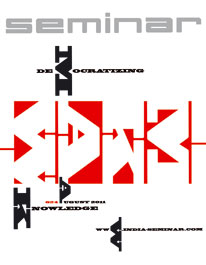 Since 1959, the ambitious monthly magazine Seminar has been published in India. With its concept, each issue dealing with a specific theme, ranging from ”Religious Minorities of India” to ”Fashioning India’s Style”, academic experts are invited to participate in a symposium, to present the problems from different angles. The end result is Seminar, an indispensable journal for anyone who really wants to understand Indian culture and society. It ought to be mandatory for academic South Asia institutions worldwide to subscribe for this magazine.
Since 1959, the ambitious monthly magazine Seminar has been published in India. With its concept, each issue dealing with a specific theme, ranging from ”Religious Minorities of India” to ”Fashioning India’s Style”, academic experts are invited to participate in a symposium, to present the problems from different angles. The end result is Seminar, an indispensable journal for anyone who really wants to understand Indian culture and society. It ought to be mandatory for academic South Asia institutions worldwide to subscribe for this magazine.
More information on Seminar’s web page.
In the August 2011 issue of the magazine, issue No. 624, Seminar focuses on ”Democratizing Knowledge”, based on a symposium on ”Reforming Higher Education”, presenting very dissenting views on what is happening in the educational sector in India right now. It includes reflections on the contemporary uses of higher education, recent reports and major bills, the struggles of teachers and students, and questions of language, interdisciplinarity, governance and accountability.
The contributors include Mary E. John, Senior Fellow and Director, Centre for Women's Development Studies, Delhi; Satish Deshpande, Professor of Sociology, Delhi School of Economics; Sudhanshu Bhushan, Professor and Head, Department of Higher and Professional Education, National University of Education Planning and Administration, Delhi; Kavita Krishnan, former President, All India Students' Association, AISA, now Editor, 'Liberation', Delhi; and Sunil Kumar, former Additional Secretary, Higher Education, MHRD, Government of India.
Go for the Seminar issue 624, with limited reading online.
• Doctoral dissertation on reproductive life of young women in Pakistan
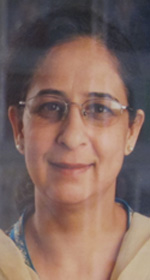 Saima Hamid Division of Global health
(IHCAR), Karolinska Institutet Medical University, Stockholm defended her doctoral dissertation entitled ”Becoming a Woman in Silence: Studies on preparedness for reproductive life of young women in Pakistan” at IHCAR on 8 December 2010. The study explores the preparedness of young women for married life (communicating with spouse, initiation of sexual activity and child bearing) and ability to negotiate in marriage with spouse on number of children to have and on contraceptive use. In a culture of silence around sexuality, young women’s socialisation into submissiveness lays the foundation for the lack of control over their future reproductive health (I and II). The parents realised, though, that bringing up daughters for marriage requires not only obedience, but also building confidence and knowledge during their childhood (III). Women who had decision making freedom in their parental home carried this ability with them into marriage in their new home and were better able to negotiate about their fertility (IV). Knowledge about reproductive life could prepare young women better for the future life and give them more control of their fertility. Innovative interventions targeting women need to challenge current societal norms of womanhood to promote the upbringing of confident and knowledgeable young women.
Saima Hamid Division of Global health
(IHCAR), Karolinska Institutet Medical University, Stockholm defended her doctoral dissertation entitled ”Becoming a Woman in Silence: Studies on preparedness for reproductive life of young women in Pakistan” at IHCAR on 8 December 2010. The study explores the preparedness of young women for married life (communicating with spouse, initiation of sexual activity and child bearing) and ability to negotiate in marriage with spouse on number of children to have and on contraceptive use. In a culture of silence around sexuality, young women’s socialisation into submissiveness lays the foundation for the lack of control over their future reproductive health (I and II). The parents realised, though, that bringing up daughters for marriage requires not only obedience, but also building confidence and knowledge during their childhood (III). Women who had decision making freedom in their parental home carried this ability with them into marriage in their new home and were better able to negotiate about their fertility (IV). Knowledge about reproductive life could prepare young women better for the future life and give them more control of their fertility. Innovative interventions targeting women need to challenge current societal norms of womanhood to promote the upbringing of confident and knowledgeable young women.
The faculty opponent was Associate Professor Pia Olsson, Department of Women's and Children's Health, International Maternal and Child Health (IMCH), Uppsala University.
More information, including link to full-text thesis.
• Doctoral dissertation on health care providers in Madhya Pradesh
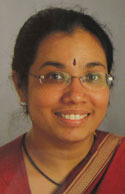 Ayesha de Costa, Division of Global health
(IHCAR), Karolinska Institutet Medical University, Stockholm defended her doctoral dissertation entitled ”Barriers of mistrust : Public and private health care providers in Madhya Pradesh, India” on 17 September 2008. The thesis highlights the heterogeneity and dominance of the private health sector, and the distribution of different provider groups in rural and urban areas/districts. Rather than an absolute shortage of manpower, maldistribution seems a problem here. Access to women providers is low, important in a setting where women would prefer seeing women providers. The possibility that scheduled castes might have lower access to health care providers than the rest of the population is presented, a finding with important political implications. The barriers to trust between the public and private health sectors in the setting are complex. Addressing these as a step to making real collaboration possible, calls for deeper more structural changes in the working of the health system, including a redressal of the regressive fee-for-service payment mechanism. The government must consider some form of health insurance for more vulnerable groups of people.
Ayesha de Costa, Division of Global health
(IHCAR), Karolinska Institutet Medical University, Stockholm defended her doctoral dissertation entitled ”Barriers of mistrust : Public and private health care providers in Madhya Pradesh, India” on 17 September 2008. The thesis highlights the heterogeneity and dominance of the private health sector, and the distribution of different provider groups in rural and urban areas/districts. Rather than an absolute shortage of manpower, maldistribution seems a problem here. Access to women providers is low, important in a setting where women would prefer seeing women providers. The possibility that scheduled castes might have lower access to health care providers than the rest of the population is presented, a finding with important political implications. The barriers to trust between the public and private health sectors in the setting are complex. Addressing these as a step to making real collaboration possible, calls for deeper more structural changes in the working of the health system, including a redressal of the regressive fee-for-service payment mechanism. The government must consider some form of health insurance for more vulnerable groups of people.
More information, with link to full-text thesis.
• Doctoral dissertation on tuberculosis care in Bangladesh
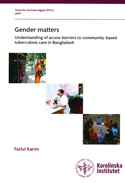 Fazlul Karim, Division of Global health
(IHCAR), Karolinska Institutet Medical University, Stockholm defended his doctoral dissertation entitled ”Gender matters: Understanding of access barriers to community-based tuberculosis care in Bangladesh” at IHCAR on 17 April 2009. The thesis concludes that sex differences exist at different clinical steps for TB control. Women compared with men, encountered longer delays at various clinical stages for TB treatment. The adverse effects of stigma both reflected and worsened gender inequalities. Gender disparities were evident in the patterns of distress, perceived causes, and help seeking behaviours, affecting more women, whilst TB-related financial distress affected more men. The estimated true period prevalence of smear-positive PTB was high in the community, and almost all socio-economic groups were at risk of TB.
Fazlul Karim, Division of Global health
(IHCAR), Karolinska Institutet Medical University, Stockholm defended his doctoral dissertation entitled ”Gender matters: Understanding of access barriers to community-based tuberculosis care in Bangladesh” at IHCAR on 17 April 2009. The thesis concludes that sex differences exist at different clinical steps for TB control. Women compared with men, encountered longer delays at various clinical stages for TB treatment. The adverse effects of stigma both reflected and worsened gender inequalities. Gender disparities were evident in the patterns of distress, perceived causes, and help seeking behaviours, affecting more women, whilst TB-related financial distress affected more men. The estimated true period prevalence of smear-positive PTB was high in the community, and almost all socio-economic groups were at risk of TB.
More information, with link to full-text thesis.
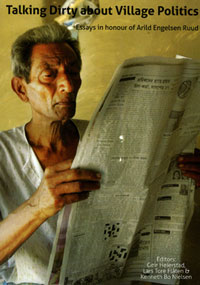 • Essays in honour of Arild Engelsen Ruud
• Essays in honour of Arild Engelsen Ruud
In June 2011, the South Asianist community in Scandinavia celebrated Professor Arild Engelsen Ruud's 50th birthday. Some of his colleagues at University of Oslo took the initative to bring out a small collection of essays (nine in all, 81 pages) in his honour. If you would like to acquire a copy of the volume, entitled ”Talking Dirty about Village Politics” may contact Dr. Kenneth Bo Nielsen at the Centre for Development and the Environment (SUM) for details about a bank transfer. An easy way to order it is otherwise simply by putting a Norwegian or Danish 100 kronor banknote in an envelope along with your return address, and send it by post to Kenneth Bo Nielsen, SUM,
PO Box 1116 Blindern, NO-0317 Oslo,
Norway.
• Maldives National University looking for Vice Chancellor
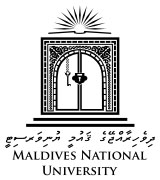 On 15th June 2011, the Maldives National University (MNU) advertised for the position of the Vice-Chancellor. He/she should be the chief academic officer to the University, that was inaugurated as late as 15 February 2011, responsible to the Council for the academic and administrative management of the university. More information.
On 15th June 2011, the Maldives National University (MNU) advertised for the position of the Vice-Chancellor. He/she should be the chief academic officer to the University, that was inaugurated as late as 15 February 2011, responsible to the Council for the academic and administrative management of the university. More information.
The
university was previously known as the Maldives College of Higher Education (MCHE) that was established on January 1, 1999, as part of a restructuring and rationalization of all government-run post-secondary education in Maldives. Operated under the aegis of the Department of Higher Education and Training, MCHE has been the only public degree-granting institution on the island, offering a range of degrees, diplomas, and certificates, with particular emphasis on engineering, health science, education, tourism, and management. The average enrollment at MCHE has been around 4,000 students in long-term (that is, more than one academic year) programs, and around 2,000 in short-term (shorter than one academic year) courses. SASNET’s Lars Eklund visited academic institutions in the Maldives in 2009, read his report.
• Nordic researchers participated in major Thimphu conference
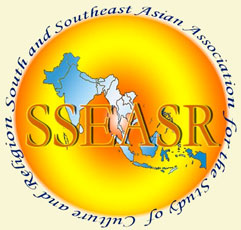 A group of Swedish and Scandinavian South Asia researchers participated in the 4th South and Southeast Asian Association for the Study of Culture and Religion (SSEASR) Conference in Thimphu, Bhutan, 30 June – 3 July 2011.
The conference theme was "Mountains in the Religions of South and Southeast Asia: Place, Culture and Power".
A group of Swedish and Scandinavian South Asia researchers participated in the 4th South and Southeast Asian Association for the Study of Culture and Religion (SSEASR) Conference in Thimphu, Bhutan, 30 June – 3 July 2011.
The conference theme was "Mountains in the Religions of South and Southeast Asia: Place, Culture and Power".
The group included Dr Jan Magnusson from the School of Social Work, Lund University, as well as Professor Heinz Werner Wessler and Professor Christiane Schaefer, both from the Department of Lingustics and Philology at Uppsala University. A number of other Nordic scholars also participated.
Jan Magnusson presented a paper on ”The Baltistan Movement and the Power of Pop Ghazals”; Heinz Werner Wessler presented a paper on ”Unmoved Movers: On Gods, Humans and India's holy Mountains”; and Christiane Schaefer a paper on ”Myth and literary imagery of rock and mountain in Old Vedic texts”.
Other Scandinavian participants were Dr István Keul, Norwegian University of Science and Technology, Trondheim; Professor Knut A. Jacobsen, University of Bergen; Professor Uwe Skoda, CISCA, Aarhus University; Jesper Oestergaard, Aarhus University; Juha-Pekka Reilin, Independent Scholar, Grönstrand; Hee Sook Lee-Niinioja, Independent scholar, Helsinki; and Dr. Tiina Hyytiäinen, University of Helsinki.
The conference was hosted and co-organised by the Institute of Language and Culture Studies, Royal University of Bhutan (RUB), Thimphu. Full information about the Thimphu conference.
• NIAS announces post-doc introductory stipends
 The Nordic Institute of Asian Studies (NIAS) in Copenhagen invites applications for five individual post-doc introductory stipends covering a period of 2-3 months for young researchers located in the Nordic countries. The research conducted at NIAS in the upcoming period falls under the umbrella of our research program “Mapping the Human Landscapes of Eurasia. Dealing with Cultural Difference in our Globalized World” which focuses on the relations between people in Asia and Europe. The European and Asian landmass exists as an entity, but distance, political borders, and cultural differences have historically kept East and West apart in understanding despite their many encounters and shared common interests. It is our firm belief that differences rooted in culture can and should be used to our mutual advantage, rather than simply recognized and consequently rejected or manipulated or utilized as a tool for stratification as has historically been the case.
The stipend period is from October 2011 or as soon as possible thereafter.
Application deadline is 1 September 2011. More information.
The Nordic Institute of Asian Studies (NIAS) in Copenhagen invites applications for five individual post-doc introductory stipends covering a period of 2-3 months for young researchers located in the Nordic countries. The research conducted at NIAS in the upcoming period falls under the umbrella of our research program “Mapping the Human Landscapes of Eurasia. Dealing with Cultural Difference in our Globalized World” which focuses on the relations between people in Asia and Europe. The European and Asian landmass exists as an entity, but distance, political borders, and cultural differences have historically kept East and West apart in understanding despite their many encounters and shared common interests. It is our firm belief that differences rooted in culture can and should be used to our mutual advantage, rather than simply recognized and consequently rejected or manipulated or utilized as a tool for stratification as has historically been the case.
The stipend period is from October 2011 or as soon as possible thereafter.
Application deadline is 1 September 2011. More information.
• Asia Research Institute announces Research Fellowships
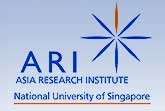 The Asia Research Institute (ARI) in Singapore announces Research Fellowships, One-Year
Visiting Research Fellowships and Postdoctoral Fellowships for commencement between April 2012 and
September 2012. ARI was established as a university-level
institute in July 2001 as one of the strategic initiatives of the National University of Singapore (NUS). It aims to provide a world-class focus and
resource for research on the Asian region, located at one of its
communication hubs. ARI engages the social sciences broadly defined, and
especially interdisciplinary frontiers between and beyond disciplines.
Through frequent provision of short-term research appointments it seeks to
be a place of encounters between the region and the world.
The Asia Research Institute (ARI) in Singapore announces Research Fellowships, One-Year
Visiting Research Fellowships and Postdoctoral Fellowships for commencement between April 2012 and
September 2012. ARI was established as a university-level
institute in July 2001 as one of the strategic initiatives of the National University of Singapore (NUS). It aims to provide a world-class focus and
resource for research on the Asian region, located at one of its
communication hubs. ARI engages the social sciences broadly defined, and
especially interdisciplinary frontiers between and beyond disciplines.
Through frequent provision of short-term research appointments it seeks to
be a place of encounters between the region and the world.
The positions are intended for outstanding active senior researchers from around
the world, to work on an important piece of research in the social
sciences and humanities. Interdisciplinary interests are encouraged. Up
to three months of a 12-month fellowship may be spent conducting fieldwork
in the Asian region.
A majority of the announced positions will be allocated to the more specific areas:
Asian Migration, Asian Urbanisms, Changing Family in Asia, Cultural
Studies in Asia, Religion and Globalisation in Asian Contexts, and
Science, Technology, and Society. However some will be reserved for
outstanding projects in any area outside of those listed, indicated as ”open category”. Applications which link more than one field are also
welcome. Closing date for applications is 1 September 2011. Full information.
• South Asia research to be included in Finnish Asia Network database
 The Asia Network in Finland is now collecting information about ongoing or recently completed research projects on East, South and Southeast Asia. The aim of the catalog is to enhance academic networking in Finland and to promote partnerships with public and private institutions. An updated list of the projects (up till 28 August 2011) will be distributed during the Asian Studies Day 2011 to be held in Tampere on 2 September, published on the website of the Network, and sent to relevant Finnish partners in public and private sectors. South Asia related projects have not previously been included in the database. More information.
The Asia Network in Finland is now collecting information about ongoing or recently completed research projects on East, South and Southeast Asia. The aim of the catalog is to enhance academic networking in Finland and to promote partnerships with public and private institutions. An updated list of the projects (up till 28 August 2011) will be distributed during the Asian Studies Day 2011 to be held in Tampere on 2 September, published on the website of the Network, and sent to relevant Finnish partners in public and private sectors. South Asia related projects have not previously been included in the database. More information.
• Report from KTH seminar with Mohammad Yunus
 KTH Royal Institute of Technology in Stockholm organised an open seminar on rural development through e-Health and e-Learning with Dr. Muhammad Yunus, Bangladeshi economist, founder of the Grameen Bank, and Nobel Peace prize winner in 2006, on Saturday 18 June 2011. It was organised by the School of Technology and Health at KTH, that is involved in projects with Grameen Communications to empower the rural people using ICT tools.
Besides Dr. Yunus, the participants were Dr. Björn Pehrsson, Dr. Björn-Erik Erlandsson, Dr. Mannan Mridha, Dr. Heikki Teriö, and Mr. Rustam Nabiev. The seminar was followed by a presentation of Social business by Dr. Mohammad Yunus and Jan Lapidoth. Read a seminar report.
KTH Royal Institute of Technology in Stockholm organised an open seminar on rural development through e-Health and e-Learning with Dr. Muhammad Yunus, Bangladeshi economist, founder of the Grameen Bank, and Nobel Peace prize winner in 2006, on Saturday 18 June 2011. It was organised by the School of Technology and Health at KTH, that is involved in projects with Grameen Communications to empower the rural people using ICT tools.
Besides Dr. Yunus, the participants were Dr. Björn Pehrsson, Dr. Björn-Erik Erlandsson, Dr. Mannan Mridha, Dr. Heikki Teriö, and Mr. Rustam Nabiev. The seminar was followed by a presentation of Social business by Dr. Mohammad Yunus and Jan Lapidoth. Read a seminar report.
• Hodgson Collection catalogued and available on the net
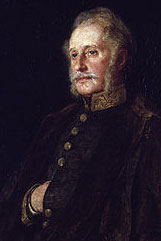 On 25 July 2011, the long awaited online catalogue of the Hodgson Collection was launched
by Michael Palin at a function at the British Library in London, UK. Brian Houghton Hodgson lived in Kathmandu from 1820 to 1843 and in
Darjeeling from 1845 to 1858. He was an early naturalist and ethnologist, and also specialized in the studies of Tibetan Buddhism, writing extensively on a range of topics relating to linguistics and religion.
On 25 July 2011, the long awaited online catalogue of the Hodgson Collection was launched
by Michael Palin at a function at the British Library in London, UK. Brian Houghton Hodgson lived in Kathmandu from 1820 to 1843 and in
Darjeeling from 1845 to 1858. He was an early naturalist and ethnologist, and also specialized in the studies of Tibetan Buddhism, writing extensively on a range of topics relating to linguistics and religion.
During his time in Nepal and India, he amassed a huge
collection of documents on multifarious subjects in a wide variety of
languages. 972 of these documents, comprising a total of some 15,300
folios plus scrolls, unnumbered notebooks and loose letters, were
deposited at the India Office Library in London in 1864.
Previously only twelve of the Hodgson Collection’s 104 volumes were properly catalogued. However, with funding first from the Leverhulme Trust and later by Michael Palin and the Friends of the British Library, leading Nepali historian Ramesh Dhungel has led the work to produce a complete online catalogue. The final editing work has then been made by John Whelpton, an independent scholar based
in Hong Kong; Mark Turin, researcher based at the University of
Cambridge, and Burkhard Quessel, the Curator of Tibetan Collections at
the British Library. View the online Hodgson catalogue.
• EPW launches Review on Urban Affairs
![]() The Indian magazine Economic and Political Weekly (EPW), published by the Sameeksha Trust in Mumbai, has launched a review of urban affairs. EPW already publishes Review of Political
Economy, Review of Labour, and Review of women's studies. Each of these is a
special collection of articles – published twice a year. The Review of Urban
Affairs likewise will be published twice a year – in recognition of the fact
that rapid urbanization is transforming the economic and political
landscape in India/South Asia. There are a total of five essays in the first first set of articles exploring different aspects of cities. They can be
viewed/downloaded from the journal's website. Go for the
introductory essay.
The Indian magazine Economic and Political Weekly (EPW), published by the Sameeksha Trust in Mumbai, has launched a review of urban affairs. EPW already publishes Review of Political
Economy, Review of Labour, and Review of women's studies. Each of these is a
special collection of articles – published twice a year. The Review of Urban
Affairs likewise will be published twice a year – in recognition of the fact
that rapid urbanization is transforming the economic and political
landscape in India/South Asia. There are a total of five essays in the first first set of articles exploring different aspects of cities. They can be
viewed/downloaded from the journal's website. Go for the
introductory essay.
Note that Economic and Political Weekly, published since 1949, offers free online access for the four most recent issues; access thereafter requires a subscription.
• More information about South Asia related
research at Swedish and Nordic universities
See SASNET’s page, http://www.sasnet.lu.se/research.html
• Still possible to apply for Hindi distance course at Stockholm University
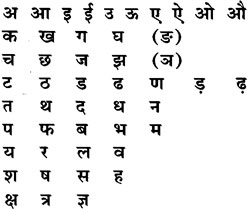 The Division of South and Central Asian Studies (Section for Indology) within the Department of
Oriental Languages runs educational courses on
the ancient as well as modern languages and cultures of
South Asia, with special emphasis on India, up to the level
of Bachelors and Masters degrees. The Indology
courses are separated into one track specialized
on Ancient and Medieval India – with Sanskrit studies, and another
track specialized on Modern India –
with Hindi studies.
Contact person:
Director of Studies Mats
Lindberg.
The Division of South and Central Asian Studies (Section for Indology) within the Department of
Oriental Languages runs educational courses on
the ancient as well as modern languages and cultures of
South Asia, with special emphasis on India, up to the level
of Bachelors and Masters degrees. The Indology
courses are separated into one track specialized
on Ancient and Medieval India – with Sanskrit studies, and another
track specialized on Modern India –
with Hindi studies.
Contact person:
Director of Studies Mats
Lindberg.
More
information on all courses run during the Fall 2011.
A popular 30 ECTS credits Internet based distance learning Hindi course was introduced in 2009, attracting many students. The teachers are Roberto Menkes and Mirja Juntunen. A new course starts in the Fall 2011. If vacant seats, it is possible to register for the course all up to the course starts in week 35. More information about the course.
• More information about South Asia related
education at Swedish and Nordic universities
See SASNET’s page, http://www.sasnet.lu.se/education.html
• Copenhagen Summer University on Decoding India
 As part of the 2011 Copenhagen Summer University academic programme, a 3-day course entitled ”Decoding India! – How to make Sense of a Paradox” will be held 15 – 17 August 2011 at the University of Copenhagen, Frederiksberg Campus. This course aims to open the theme of India's rise as a global power and the paradoxes that underpin the phenomenon. It offers an insight into the fast transforming social-political landscape both conceptually and empirically. The workshop sessions will focus on the structures and forms of ‘power' and the ways in which cultural signs – social status, ‘connections' and ‘clout' across religion, caste and ethnic divides - of power are recognized and practiced. It is aimed at businesses, media, NGOs and foreign policymakers who interact with 'Official India', and seek to acquire and enhance their understanding of the cultural underpinnings of this interaction. The course director is Associate Professor Ravinder Kaur, Department of Cross-cultural and Regional Studies, University of Copenhagen. More information
As part of the 2011 Copenhagen Summer University academic programme, a 3-day course entitled ”Decoding India! – How to make Sense of a Paradox” will be held 15 – 17 August 2011 at the University of Copenhagen, Frederiksberg Campus. This course aims to open the theme of India's rise as a global power and the paradoxes that underpin the phenomenon. It offers an insight into the fast transforming social-political landscape both conceptually and empirically. The workshop sessions will focus on the structures and forms of ‘power' and the ways in which cultural signs – social status, ‘connections' and ‘clout' across religion, caste and ethnic divides - of power are recognized and practiced. It is aimed at businesses, media, NGOs and foreign policymakers who interact with 'Official India', and seek to acquire and enhance their understanding of the cultural underpinnings of this interaction. The course director is Associate Professor Ravinder Kaur, Department of Cross-cultural and Regional Studies, University of Copenhagen. More information
• Sunita Narain keynote speaker at Stockholm World Water Week 2011
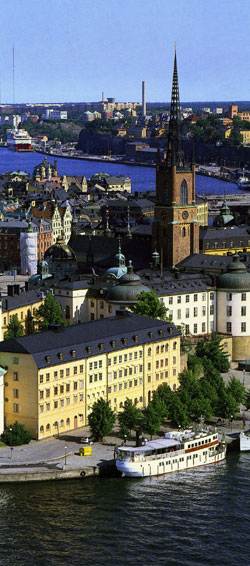 The 2011 World Water Week in Stockholm will be held 21–27 August 2011. The theme for 2011 is ”Responding to Global Changes – Water in an Urbanising World”. The21st World Water Week is as usual organised by the Stockholm International Water Institute (SIWI).
The 2011 World Water Week in Stockholm will be held 21–27 August 2011. The theme for 2011 is ”Responding to Global Changes – Water in an Urbanising World”. The21st World Water Week is as usual organised by the Stockholm International Water Institute (SIWI).
It is the leading annual global meeting place for capacity-building,
partnership-building and follow-up on the implementation of international
processes and programmes in water and development, with large relevance
to South Asia. The conference is filled with plenary sessions, seminars, workshops,
side events and special activities.
The Scientific Programme Committee (SPC) planning for the conference is chaired by Prof. Jan Lundqvist at SIWI (previously at the Dept. of Water and Environmental Studies, Linköping
University), and also includes Prof. Paul Appasamy, Katunya University, India.
Venue: Stockholm
International Fairs and Congress Center (Stockholmsmässan) in Älvsjö, 9 km south of central Stockholm.
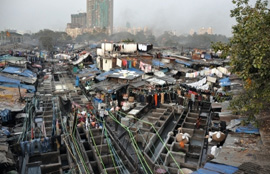 At the 2011 World Water Week eight workshops will be held. They focus on: – Cities in a 3-D Landscape Perspective – Hidden Risks; – Need for a Paradigm Shift: New Technologies and New Lifestyles: – Water for Sustainable Urban Growth; – The Urban Shadow ; – Regulatory and Social Contexts for Institutional Performance; – Financing Urban Infrastructure; – Adapting Cities to Climate Variability and Change; and – Urban Inequities: Service Delivery and Social Development.
At the 2011 World Water Week eight workshops will be held. They focus on: – Cities in a 3-D Landscape Perspective – Hidden Risks; – Need for a Paradigm Shift: New Technologies and New Lifestyles: – Water for Sustainable Urban Growth; – The Urban Shadow ; – Regulatory and Social Contexts for Institutional Performance; – Financing Urban Infrastructure; – Adapting Cities to Climate Variability and Change; and – Urban Inequities: Service Delivery and Social Development.
South Asian keynote speakers and invited panellists
include Dr. Sunita Narain, Centre for Science and Environment, New Delhi; Mr. Subodh Kumar, Municipal Commissioner of Mumbai; Ms. Sheela Patel, Chair of Shack/Slum Dwellers International; and Dr. Prakash Nelliyat, Anna University, Chennai.
Full information on the WWW 2011.
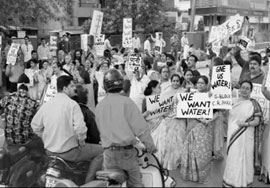 As part of the 2011 WWW, Dr. Nandita Singh, Dept. of Land and Water Resources Engineering, Royal Institute of Technology (KTH), Stockholm, and her husband, Mr. O.P. Singh, present a photo exhibition entitled ”Urban Right to Water and Sanitation”. It is a photographic depiction on how effectively are the residents of Delhi – one of the most highly populated cities of the world – enjoy their right to water and sanitation? Will the teeming millions be ever able to enjoy this basic right?, is the question. More information about the exhibition.
As part of the 2011 WWW, Dr. Nandita Singh, Dept. of Land and Water Resources Engineering, Royal Institute of Technology (KTH), Stockholm, and her husband, Mr. O.P. Singh, present a photo exhibition entitled ”Urban Right to Water and Sanitation”. It is a photographic depiction on how effectively are the residents of Delhi – one of the most highly populated cities of the world – enjoy their right to water and sanitation? Will the teeming millions be ever able to enjoy this basic right?, is the question. More information about the exhibition.
• Kathmandu conference on Changing Dynamics in Nepali Society and Politics
 An international interdisciplinary academic conference on "Changing Dynamics in Nepali Society and Politics" is held in Kathmandu 17 - 19 August 2011. The main goal of the conference, which is organized by the Association for Nepal and Himalayan Studies, Social Science Baha and Alliance for Social Dialogue, is to analyse trends and aspects of changes in the Nepali politics and society, as well as their intersections. The ultimate aim will be to provide expert policy related recommendations and identify areas where change is visible. Sage Publications and/or Social Science Baha will publish selected papers after the event. The organizers provide limited travel grants for international participants, and full accommodation for everyone. Full information (as pdf-file)
An international interdisciplinary academic conference on "Changing Dynamics in Nepali Society and Politics" is held in Kathmandu 17 - 19 August 2011. The main goal of the conference, which is organized by the Association for Nepal and Himalayan Studies, Social Science Baha and Alliance for Social Dialogue, is to analyse trends and aspects of changes in the Nepali politics and society, as well as their intersections. The ultimate aim will be to provide expert policy related recommendations and identify areas where change is visible. Sage Publications and/or Social Science Baha will publish selected papers after the event. The organizers provide limited travel grants for international participants, and full accommodation for everyone. Full information (as pdf-file)
• 15th International Association for Ladakh Studies conference moved to Leh
 The 15th Conference of the International Association for Ladakh Studies in Leh, India from 24 to 28 August 2011. It is a multidisciplinary event, where scholars from different fields may interact fruitfully. Originally the 2011 conference was supposed to be held in Avberdeen, Scotland.
The 15th Conference of the International Association for Ladakh Studies in Leh, India from 24 to 28 August 2011. It is a multidisciplinary event, where scholars from different fields may interact fruitfully. Originally the 2011 conference was supposed to be held in Avberdeen, Scotland.
The central theme of the conference is defined as ‘Responding to Climate, Biodiversity and Resource Changes in Ladakh and the Western Himalaya’. Ladakh, together with the adjacent Western Himalayan regions of Baltistan, Lahaul, Spiti and Western Tibet, has for much of the last century existed on an unstable fault line between crucial cultural, religious and political blocs of South and Central Asia. Lying in the rain-shadow of the Greater Himalaya, these regions are now experiencing freak weather events more associated with the Indian monsoon.
Centred on the Indus Valley, the region, which is also home to rare species of flora and fauna constituting a globally important biodiversity, has been substantially affected by recent economic development and population shifts occurring all along the Himalayan massif, and faces a challenging future. Changes in climate, rainfall and biodiversity have had a dramatic impact on human habitation, resource use and the prospects for cultural and economic development in the area and its environs.
This conference will bring together a multidisciplinary range of scholars, scientists and local specialists to examine not only the changes themselves, but the social, economic and political responses to them. More information. ![]()
• Delhi research symposium on Health and Medicine in Princely India
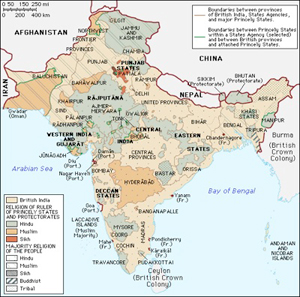 A
Research Symposium on ”Health and Medicine in Princely India” will be held in New Delhi 30–31 August 2011. The symposium is part of the ongoing collaborative research work, funded by The Wellcome Trust, between Prof. W. Ernst (Oxford Brookes University), Dr B. Pati (Delhi University) and Dr T.V. Sekher (International Institute for Population Sciences, Mumbai) on ‘Colonial Medicine and Indigenous Health Practices in Southern and Eastern Princely States of India, c. 1880-1960’.
This symposium brings together researchers working on medicine and health in the former Princely States of India. About two fifths of the Subcontinent was made up of over 500 Indian States. Putting Princely India at the centre of investigation is important because existing scholarship on colonial medicine has been concerned almost exclusively with the regions under direct British control, leading to a distorted conception of the political realities and medical developments during the age of British imperialism. The assessment of developments in 'Indian India' will therefore contribute to a more nuanced understanding of the nature and impact of western medicine. More information.
A
Research Symposium on ”Health and Medicine in Princely India” will be held in New Delhi 30–31 August 2011. The symposium is part of the ongoing collaborative research work, funded by The Wellcome Trust, between Prof. W. Ernst (Oxford Brookes University), Dr B. Pati (Delhi University) and Dr T.V. Sekher (International Institute for Population Sciences, Mumbai) on ‘Colonial Medicine and Indigenous Health Practices in Southern and Eastern Princely States of India, c. 1880-1960’.
This symposium brings together researchers working on medicine and health in the former Princely States of India. About two fifths of the Subcontinent was made up of over 500 Indian States. Putting Princely India at the centre of investigation is important because existing scholarship on colonial medicine has been concerned almost exclusively with the regions under direct British control, leading to a distorted conception of the political realities and medical developments during the age of British imperialism. The assessment of developments in 'Indian India' will therefore contribute to a more nuanced understanding of the nature and impact of western medicine. More information.
• CBS conference on Innovative Technologies for Future Markets
 Copenhagen Business School (CBS) and Danish Design Association invite participants to the Copenhagen Co-Creation Conference on 1–2 September 2011. The theme for the conference is ‘Co-creating Innovative Technologies for Future Markets’. This conference will gather stakeholders from the academia, the industry and the civil society to create an environment of proactive dialogue about co-creation.
Copenhagen Business School (CBS) and Danish Design Association invite participants to the Copenhagen Co-Creation Conference on 1–2 September 2011. The theme for the conference is ‘Co-creating Innovative Technologies for Future Markets’. This conference will gather stakeholders from the academia, the industry and the civil society to create an environment of proactive dialogue about co-creation.
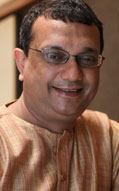 This two-day event kicks off a larger initiative led by the Co-Creation Lab for Innovation for Future Markets (CCLIFM) led by Dr. Sudhanshu Rai (photo) and the IT Innovation team from the Department of Informatics at CBS. They work together with researchers at Indian Institute of Technology (IIT) Mumbai, and their aim is to establish a co-creation lab in Copenhagen, at CBS, and at IIT Mumbai for engaging with real time innovation for seeking new markets.
This two-day event kicks off a larger initiative led by the Co-Creation Lab for Innovation for Future Markets (CCLIFM) led by Dr. Sudhanshu Rai (photo) and the IT Innovation team from the Department of Informatics at CBS. They work together with researchers at Indian Institute of Technology (IIT) Mumbai, and their aim is to establish a co-creation lab in Copenhagen, at CBS, and at IIT Mumbai for engaging with real time innovation for seeking new markets.
More information on the conference web page.
• Heidelberg conference on Frontiers of Knowledge: Health, Environment and the History of Science
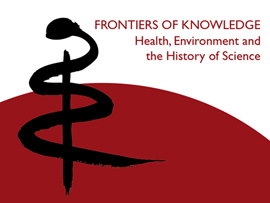 The third Annual Conference of the Cluster of Excellence ”Asia and Europe in a Global Context” will be held at Heidelberg University, Germany, 5–7 October 2011. This year’s topic is ”Frontiers of Knowledge: Health, Environment and the History of Science”. The conference presents the ongoing research results of the Cluster’s Research Area C ”Health and Environment” in collaboration with renowned scholars from around the globe. Together they will examine and discuss transcultural issues in these fields transgressing the conventional intellectual divisions between Asia and Europe.
The third Annual Conference of the Cluster of Excellence ”Asia and Europe in a Global Context” will be held at Heidelberg University, Germany, 5–7 October 2011. This year’s topic is ”Frontiers of Knowledge: Health, Environment and the History of Science”. The conference presents the ongoing research results of the Cluster’s Research Area C ”Health and Environment” in collaboration with renowned scholars from around the globe. Together they will examine and discuss transcultural issues in these fields transgressing the conventional intellectual divisions between Asia and Europe.
The conference features keynote lectures by Prof. Sunder Rajan (University of Chicago) on transcultural health and Prof. Janet Hunter (London School of Economics) on earthquake and economics. Four major panel sessions will discuss the topics ”Ancient Medicine”; ”Circulation and Changing of Conceptions of Knowledge”; ”Travelling Technologies, Tracing Transculturality: Paradigm Shifts in Science, Medicine and Society”, and ”Seascapes and Shipping”. To showcase the research being conducted at the Cluster, twelve further panels will question how we have conceived and are conceiving knowledge in the past and present. During the Annual Conference 2011, the ”Transcultural Studies Association” will be ceremonially inaugurated.
Announce your interest to participate in the conference before 23 September 2011. Full information about the Heidelberg conference.
• Rome conference on Politics and religions in the Himalayas
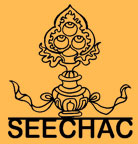 The Paris based European Society For Studies Of Central Asia and Himalayan Regions (SEECHAC) organises its second international Colloquium on Politics and religions in the
Himalayas and Central Asia in Rome, Italy on 10–11 October 2011. The theme for the 2011 Coloquium is ”The political and
religious expression of sovereignty in the Himalayas
and Central Asia: rituals, texts, representations and institutions
from antiquity till now”. Every SEECHAC member may attend the sessions. The papers may be delivered and written in any European language, preferably in English, Italian or French. Venue for the conference: Museo Nazionale d’Arte Orientale, Rome.
More information.
The Paris based European Society For Studies Of Central Asia and Himalayan Regions (SEECHAC) organises its second international Colloquium on Politics and religions in the
Himalayas and Central Asia in Rome, Italy on 10–11 October 2011. The theme for the 2011 Coloquium is ”The political and
religious expression of sovereignty in the Himalayas
and Central Asia: rituals, texts, representations and institutions
from antiquity till now”. Every SEECHAC member may attend the sessions. The papers may be delivered and written in any European language, preferably in English, Italian or French. Venue for the conference: Museo Nazionale d’Arte Orientale, Rome.
More information.
• INRISD conference on Green Economy and Sustainable Development
 The United Nations Research Institute for Social Development (UNRISD) organizes the ”Green Economy and Sustainable Development Conference: Bringing Back the Social Dimension” in Geneva, Switzerland on 10–11 October 2011. This conference will critically examine a range of issues and questions related to social impacts and distributional consequences of policies and processes associated with green economy; the potential and limits of structural and institutional change; and agency and social mobilization for institutional and policy change. UNRISD invites abstracts that address these cross-cutting themes, as well as abstracts that contribute to the broader conceptualization of the social dimensions of green economy and sustainable development. Registration is online only, and is open from 1 August to 1 September 2011.
The United Nations Research Institute for Social Development (UNRISD) organizes the ”Green Economy and Sustainable Development Conference: Bringing Back the Social Dimension” in Geneva, Switzerland on 10–11 October 2011. This conference will critically examine a range of issues and questions related to social impacts and distributional consequences of policies and processes associated with green economy; the potential and limits of structural and institutional change; and agency and social mobilization for institutional and policy change. UNRISD invites abstracts that address these cross-cutting themes, as well as abstracts that contribute to the broader conceptualization of the social dimensions of green economy and sustainable development. Registration is online only, and is open from 1 August to 1 September 2011.
More information.
• Delhi conference on Asian Encounters: Networks of Cultural Interaction
An international conference on "Asian Encounters: Networks of Cultural Interaction" will take place in New Delhi, 1–3 November 2011. It is being organised by the IIC-Asia Project and the Dept. of History at the University of Delhi and it will explore the cultural interactions on the Asian continent in pre-modern times. Primary topics of the conference will be: – Historical contexts and avenues of cultural interaction; – Aesthetic theories and praxis; – Religious and cultural matrices of artistic and literary discourse; – Art, religion, and literature: inter-relationships, transmission and
transformation of the narrative, iconic, and built traditions; – The artist and the creative process; context, patronage, and reception of art; – The past in the present: museums of Asian art; archaeological and
conservation practices. More information.
• Indo-Swedish seminar on Practice-based Knowledge in the 21st Century
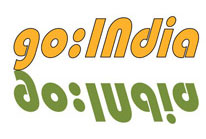 An International Indo-Swedish Seminar on ”Practice-based Knowledge in the 21st Century” will be held in Varanasi, India, 14–16 November 2011. It is being organized by the Dept. of Philosophy & Religion, Faculty of Arts at Banaras Hindu University (BHU), under the auspices of the BHU-Gothenburg University collaboration within the GO:India programme. The aim of this conference is to see and reflect on new sides of the social worlds
and the social and humanistic sciences in India and Sweden using the perspectives of
practice based knowledge developed within social work, religious work, health care as
well as in the arts and philosophy, in order to identify and generate new interesting
platforms for academic cooperation. Abstracts should be submitted before 15 September 2011. More information.
An International Indo-Swedish Seminar on ”Practice-based Knowledge in the 21st Century” will be held in Varanasi, India, 14–16 November 2011. It is being organized by the Dept. of Philosophy & Religion, Faculty of Arts at Banaras Hindu University (BHU), under the auspices of the BHU-Gothenburg University collaboration within the GO:India programme. The aim of this conference is to see and reflect on new sides of the social worlds
and the social and humanistic sciences in India and Sweden using the perspectives of
practice based knowledge developed within social work, religious work, health care as
well as in the arts and philosophy, in order to identify and generate new interesting
platforms for academic cooperation. Abstracts should be submitted before 15 September 2011. More information.
• Comparative Education Society of India annual conference
The Comparative Education Society of India (CESI) invites participants to its Annual
International Conference 2011 to be held in Hyderabad, India 16–18 November 2011. It is being organised under the auspices of the Dept. of Sociology, University of
Hyderabad. Scholars of South Asia who are working on the issues related to education are encouraged to send their abstracts. The theme of the 2011 conference is 'Rethinking Education Policy'. An attempt will be
made to discuss and debate education policy in its entirety from
a comparative perspective. The Conference is expected to bring
educationists, social scientists, policy makers and practitioners
together to deliberate various aspects of the dynamics of
education policy and its making and processes. More information.
• Delhi conference on Structures of Exclusion in South Asia
 A conference on
'Structures of Exclusion in South Asia' will be held at
University of Delhi, 23 – 25 November 2011. It is organised by the Indian Formation
Research Society as an interdisciplinary and politically independent gathering. It builds upon the previous
conferences on 'Culture, Politics & Economics of South Asian Migration' (2010), 'Region
Formation in Contemporary South Asia' (2009) and 'The Character & Trajectory of the Indian
Economic Formation in an Era of Globalisation' (2008).
A conference on
'Structures of Exclusion in South Asia' will be held at
University of Delhi, 23 – 25 November 2011. It is organised by the Indian Formation
Research Society as an interdisciplinary and politically independent gathering. It builds upon the previous
conferences on 'Culture, Politics & Economics of South Asian Migration' (2010), 'Region
Formation in Contemporary South Asia' (2009) and 'The Character & Trajectory of the Indian
Economic Formation in an Era of Globalisation' (2008).
The conference deals with the well-known existence of institutionalised exclusion in South Asia:
social, economic,
political and cultural inequities typically defining the corpus identity of academic South Asian
studies. Yet, the research area is actually seriously undertheorised.
As compared to other Third World societies, state formations in South Asia have certain
similarities, and some unique traits.
Abstract should be submitted before
30 September 2011. Full information about the conference.
• South Asia in focus at 2011 Nordic conference on development research
 A Nordic conference on 'Future of Development Research: Exploring the Nordic perspective(s)?' will be held in Copenhagen, Denmark, 24–25 November 2011. It is jointly organised by the Dag Hammarskjöld Foundation in Uppsala; the Nordic Africa Institute in Uppsala, the Finnish Society for Development Research (FSDR), the Norwegian Association of Development Researchers (NFU), and the Association of Development Researchers in Denmark (FAU). A number of Nordic institutions working in the field of development research are also involved, in Sweden the School of Global Studies & Gothenburg Centre for Globalization and Development, both at Gothenburg University.
Venue for the conference: Copenhagen Business School (CBS), Dalgas Have, Copenhagen.
A Nordic conference on 'Future of Development Research: Exploring the Nordic perspective(s)?' will be held in Copenhagen, Denmark, 24–25 November 2011. It is jointly organised by the Dag Hammarskjöld Foundation in Uppsala; the Nordic Africa Institute in Uppsala, the Finnish Society for Development Research (FSDR), the Norwegian Association of Development Researchers (NFU), and the Association of Development Researchers in Denmark (FAU). A number of Nordic institutions working in the field of development research are also involved, in Sweden the School of Global Studies & Gothenburg Centre for Globalization and Development, both at Gothenburg University.
Venue for the conference: Copenhagen Business School (CBS), Dalgas Have, Copenhagen.
Conference information by FAU, or by NFU.
 The theme of the conference’s workshop no. 9 is ”Nordic Perspectives on South Asian Development”. The workshop is organised by
Kenneth Bo Nielsen, Centre for Development and the Environment, University of Oslo;
Dayabati Roy, Dept. of Cross-Cultural and Regional Studies, University of Copenhagen; and Annika Wetlesen, Dept. of Sociology and Human Geography, University of Oslo. See the call for papers for the South Asia workshop
The theme of the conference’s workshop no. 9 is ”Nordic Perspectives on South Asian Development”. The workshop is organised by
Kenneth Bo Nielsen, Centre for Development and the Environment, University of Oslo;
Dayabati Roy, Dept. of Cross-Cultural and Regional Studies, University of Copenhagen; and Annika Wetlesen, Dept. of Sociology and Human Geography, University of Oslo. See the call for papers for the South Asia workshop
This year, University of Oslo has decided to merge its Annual Contemporary India Seminar with the joint Nordic conference on development research in Copenhagen and its workshop no. 9. At the same time broadening the focus for the seminar somewhat, opening up for contributions that focus on other parts of South Asia as well.
• Oxford conference on South Asia in Transition
 The Department of Sociology at the University of Oxford organises a conference on South Asia in Transition to be held 25–26 November 2011. Its aim is to explore and capture the social, political, economic and cultural transformations that have taken place in India, Pakistan, Bangladesh, Nepal, Sri Lanka, Bhutan, Afghanistan and Maldives in the past twenty years. The primary panels will encompass the following themes: – Political Participation: Democracy, Dictatorship and Beyond; – Transformations in Political Economy: State, Capital and Changing Labour Relations; – Politics of Resistance: Social Movement and Violent Conflicts; – Social Exclusion and the Minority Question; – The South Asian Diaspora: The Politics of Conflict, Identity and Change; – Reaching 'the poor': Towards Multidimensional Poverty Eradication Throughout South Asia. Papers from younger researchers are welcome and should be submitted before 15 August 2011. More information.
The Department of Sociology at the University of Oxford organises a conference on South Asia in Transition to be held 25–26 November 2011. Its aim is to explore and capture the social, political, economic and cultural transformations that have taken place in India, Pakistan, Bangladesh, Nepal, Sri Lanka, Bhutan, Afghanistan and Maldives in the past twenty years. The primary panels will encompass the following themes: – Political Participation: Democracy, Dictatorship and Beyond; – Transformations in Political Economy: State, Capital and Changing Labour Relations; – Politics of Resistance: Social Movement and Violent Conflicts; – Social Exclusion and the Minority Question; – The South Asian Diaspora: The Politics of Conflict, Identity and Change; – Reaching 'the poor': Towards Multidimensional Poverty Eradication Throughout South Asia. Papers from younger researchers are welcome and should be submitted before 15 August 2011. More information.
• Kolkata conference on Conflict, Terrorism and Resolution
The Center for South and Southeast Asian Studies, University of Calcutta in Kolkata, India organizes an International seminar on ”Conflict, Terrorism and Resolution: The South Asian Scenario” on 26 November 2011. The event will be attended by foreign delegates from SAARC and Southeast Asian countries, including, scholars, experts and academicians from India. The Seminar is aimed at providing an interactive platform for sharing of expertise and experience between India and other South Asian countries which are severely affected by the scourge of terrorism and militancy. Keeping the annihilation of founder-figures of terrorist organization, the al-Qaeda and the LTTE in mind, the deliberations of the seminar is an attempt to examine the security situation of the region, the law enforcement mechanisms and cooperation amongst global/regional organizations to fight the scourge of terrorism in the most volatile region of the world.
Among the sessions, one focuses on ”Future of Terrorism in South Asia”, chaired by Prof. Purusottam Bhattacharya, Jadavpur University; another on ”The Internal Dynamics of Militancy, Conflict and Separatism in South Asia”, chaired by Prof. Rajagopal Dhar Chakraborti, Calcutta University; and a third on ”Counter-Terrorism Cooperation in Fighting the Malaise of Terrorism in South Asia”, chaired by Prof. Swapna Bhattacharya Chakraborti, Calcutta University.
• Islamabad conference on Public Action in Pakistan
 The Institute of Social and Policy Sciences (I-SAPS) in Islamabad, Pakistan invites papers for the
first annual Colloquium on ”Public Action in Pakistan: Vacillating between
Apathy and Anger” to be held 27–28 November 2011. The Colloquium is first in the series of annual
multi-disciplinary colloquia which will allow different social sciences
perspectives leverage and enrich each other. Beyond its scholarly goals,
the organisers hope that the Colloquium would inform the debates on public policy and
development agenda in Pakistan. I-SAPS is inviting scholars in local as well as international academia to
discuss the difficulties in dealing with social change especially in
developing and Muslim societies like Pakistan from multi-disciplinary
aspects, with special reference to individual’s personal behavior and its
relation to societal changes. More information.
The Institute of Social and Policy Sciences (I-SAPS) in Islamabad, Pakistan invites papers for the
first annual Colloquium on ”Public Action in Pakistan: Vacillating between
Apathy and Anger” to be held 27–28 November 2011. The Colloquium is first in the series of annual
multi-disciplinary colloquia which will allow different social sciences
perspectives leverage and enrich each other. Beyond its scholarly goals,
the organisers hope that the Colloquium would inform the debates on public policy and
development agenda in Pakistan. I-SAPS is inviting scholars in local as well as international academia to
discuss the difficulties in dealing with social change especially in
developing and Muslim societies like Pakistan from multi-disciplinary
aspects, with special reference to individual’s personal behavior and its
relation to societal changes. More information.
•
CISCA workshops on Visual Culture in Aarhus and Delhi
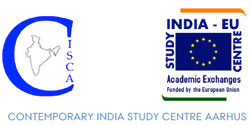 The Contemporary India Study Centre Aarhus (CISCA), and the Dept. of History and Area Studies at Aarhus
University, Denmark host a set of two workshops on Visual Cultures in Contemporary India, in collaboration with Sri Venkateswara College at Delhi University in India. The first workshop will be held at Aarhus University on 8–9 December 2011, while the second one will be located at Sri Venkateswara College a month later, 8–9 January 2012.
The Contemporary India Study Centre Aarhus (CISCA), and the Dept. of History and Area Studies at Aarhus
University, Denmark host a set of two workshops on Visual Cultures in Contemporary India, in collaboration with Sri Venkateswara College at Delhi University in India. The first workshop will be held at Aarhus University on 8–9 December 2011, while the second one will be located at Sri Venkateswara College a month later, 8–9 January 2012.
The first workshop is reserved for a broader mapping of this multi-facetted and dynamic field with its diverse
traditions and innovative potential in India and South Asia. Thus, the workshop focuses on the development of
various media, but also on the motives, strategies and approaches of the producers as well as consumers – exploring visual cultures in relation to themes such as nationalism; gender, family and kin; urban and rural
images, religion or diaspora and transnational flows.
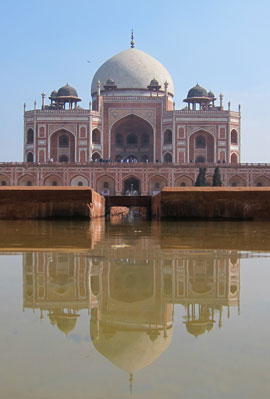 Delhi became the capital of a north Indian empire in 13th century and – with some exceptions – remained a
capital most of the later years. In general, India had many phases of strong urbanity and urban cultures, right from Harappan civilization to modern New Delhi. And with New Delhi completing its century in 2011, it may be
a fitting tribute to hold the second workshop on how Delhi has been seen in visual cultures over the centuries.
Delhi became the capital of a north Indian empire in 13th century and – with some exceptions – remained a
capital most of the later years. In general, India had many phases of strong urbanity and urban cultures, right from Harappan civilization to modern New Delhi. And with New Delhi completing its century in 2011, it may be
a fitting tribute to hold the second workshop on how Delhi has been seen in visual cultures over the centuries.
Thus, the organisers would like to commemorate, analyse and document the visual past of Delhi and, more broadly, urban
India and wish to explore and document how Delhi has been seen and portrayed in various forms of visual
cultures.
Proposals are invited for either one of them from scholars who have worked on relevant areas. Though both workshops are organized jointly individual contributionsare most welcome to one or the
other.
Deadlines for submitting abstracts are 31 August 2011 (Aarhus workshop), and
30 2011 September (Delhi workshop).
Full information about the CISCA workshops.
• Fifth SASNET Fermented Foods workshop to be held in Mysore
The fifth International Seminar and Workshop on Fermented Foods Health Status and Social Wellbeing will be organised by SASNET – Fermented Foods at the Central Food Technological Research Institute (CFTRI) in Mysore, India on 15th and 16th of December 2011. SASNET Fermented Foods is a forum for scientists of the south Asian countries, Sweden and other countries for exchanging information in the field of food fermentation and its practical application. It was launched in 2003 by Prof. Baboo Nair, Division of Applied Nutrition and Food Chemistry, Lund University.
For more details around the 2011 workshop, please contact the organising secretary, Dr. G. Vijayalekshmi, Deputy Director, Food Microbiology Department, CFTRI. More information about SASNET Fermented Foods.
• 14th International Forum on Contemporary Theory in Jaipur
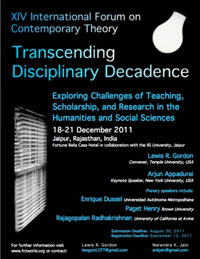 The 14th International Forum on Contemporary Theory will be held in Jaipur, Rajasthan, India 18-21 December 2011. The main topic this year is ”Transcending Disciplinary Decadence” and will aim at exploring challenges in front of the social sciences, humanities and scholarship in these fields today, from the perspectives of globalisation, market considerations and neoliberal university policies, as well as the so called ”colonialisation” of knowledge. Keynote speaker opening the conference will be the renowned Prof. Arjun Appadurai from New York University. The traditional special plenary session on a regional text will this year be dedicated to the famous modern Hindi-Urdu modernist Munshi Premchand's and his novel Godan (1936), known in English as ”The Gift of a Cow”. Abstracts should be submitted before 30 August 2011.
The 14th International Forum on Contemporary Theory will be held in Jaipur, Rajasthan, India 18-21 December 2011. The main topic this year is ”Transcending Disciplinary Decadence” and will aim at exploring challenges in front of the social sciences, humanities and scholarship in these fields today, from the perspectives of globalisation, market considerations and neoliberal university policies, as well as the so called ”colonialisation” of knowledge. Keynote speaker opening the conference will be the renowned Prof. Arjun Appadurai from New York University. The traditional special plenary session on a regional text will this year be dedicated to the famous modern Hindi-Urdu modernist Munshi Premchand's and his novel Godan (1936), known in English as ”The Gift of a Cow”. Abstracts should be submitted before 30 August 2011.
More information.
• Dhaka conference on Development Initiatives and Social Movements
An interdisciplinary conference on "Cultural Transformations: Development Initiatives and Social Movements" will be held in Dhaka, Bangladesh on 17 – 18 December 2011. The conference is organised by the Dept. of English and Humanities and BRAC Development Institute at BRAC University and will aim at gathering local and international academics and practitioners to problematise the idea of Asia. A call for papers is open and submissions are accepted by 31 May 2011. The submitted papers should focus on some of the following topics: – Social movements and struggles; – Development initiatives and cultural change; – Asian feminisms and social change; – The post-colonial, the national and the pan-Asian in the formation of new cultural identities, – Changes and developments in popular cultural practices, including music, dance, film and popular literature. Other topics in Inter-Asia Cultural Studies are also welcome. The organisers will provide for the accommodation of the conferencec participants. More information.
• Delhi conference on Meaning, Culture and Values: East and West
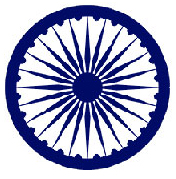 An International Interdisciplinary Conference on ”Meaning, Culture and Values: East and West” will be held in New Delhi, India, 5-7 January 2012.
It is being organised by the Society of Indian Philosophy and Religion. Subtopics include Ethnic Identity & Culture, Indian Civilization & Society, Role of Culture & Religion, and Cultural Meaning, Buddhism & Postmodernity. Selected papers from the conference will be published in the Journal of International and Interdisciplinary Studies and the Journal of Indian Philosophy and Religion). Advisory board members include Dr. Tommi Lehtonen from University of Vaasa in Finland. Abstracts should be submitted by e-mail to the conference convener Dr. Chandana Chakrabarti, Elon University in North Carolina, USA. More information.
An International Interdisciplinary Conference on ”Meaning, Culture and Values: East and West” will be held in New Delhi, India, 5-7 January 2012.
It is being organised by the Society of Indian Philosophy and Religion. Subtopics include Ethnic Identity & Culture, Indian Civilization & Society, Role of Culture & Religion, and Cultural Meaning, Buddhism & Postmodernity. Selected papers from the conference will be published in the Journal of International and Interdisciplinary Studies and the Journal of Indian Philosophy and Religion). Advisory board members include Dr. Tommi Lehtonen from University of Vaasa in Finland. Abstracts should be submitted by e-mail to the conference convener Dr. Chandana Chakrabarti, Elon University in North Carolina, USA. More information.
• Re-evaluating the Postcolonial City theme for Leeds conference
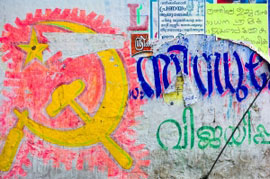 The Annual Institute of Colonial and Postcolonial Studies (ICPS), University of Leeds) and Postcolonial Studies Association (PSA) Postgraduate Conference will take place 2–3 February 2012 at University of Leeds, UK. The theme for the 2012 conference will be ‘Re-evaluating the Postcolonial City: Production, Reconstruction, Representation’, and is likely to have a strong Asian Studies strand running through it.
The Annual Institute of Colonial and Postcolonial Studies (ICPS), University of Leeds) and Postcolonial Studies Association (PSA) Postgraduate Conference will take place 2–3 February 2012 at University of Leeds, UK. The theme for the 2012 conference will be ‘Re-evaluating the Postcolonial City: Production, Reconstruction, Representation’, and is likely to have a strong Asian Studies strand running through it.
This conference re-evaluates the postcolonial city-space as a site of cultural production. The postcolonial city has reconfigured itself in literature and culture, as an urban space that incessantly explores its modernity along various, conflicting lines of identity, representation and consumption. The event brings together practicing cultural producers and their critics, early career scholars and postgraduate students working with the subject of the postcolonial city. In order to re-evaluate the impact of the postcolonial city on lives beyond the remit of the academy, we seek to posit the figure of the cultural producer as a primary focus area of our conference. Abstracts should be submitted before 15 September 2011. More information.
• Fourth Gujarat Studies Association in Dubai
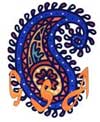 The Gujarat Studies Association (GSA) invites to its 4th Biennial Conference to be held 15–16 February 2012 in Dubai, United Arab Emirates. The theme for the conference will be ”The Gujarati Community: Globalisation, Mobility and Belonging”. Keynote speakers are Dr. Farouk Topan from Aga Khan University Institute for the Study of Muslim Civilisations (AKU-ISMC) in London, UK; and Prof. Helene Basu, University of Münster, Germany. Deadline for submitting abstracts is 12 September 2011.
The Gujarat Studies Association (GSA) invites to its 4th Biennial Conference to be held 15–16 February 2012 in Dubai, United Arab Emirates. The theme for the conference will be ”The Gujarati Community: Globalisation, Mobility and Belonging”. Keynote speakers are Dr. Farouk Topan from Aga Khan University Institute for the Study of Muslim Civilisations (AKU-ISMC) in London, UK; and Prof. Helene Basu, University of Münster, Germany. Deadline for submitting abstracts is 12 September 2011.
More information.
• 40th World Congress of International Institute of Sociology in Delhi
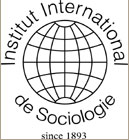 The 40th World Congress of International Institute of Sociology (IIS) will be held at New Delhi, India 16–19 February 2012. The theme of the conference is ”After Western Hegemony: Social Science and its Publics”. It is jointly sponsored by the Centre for the Study of Developing Societies (CSDS) in Delhi and the Swedish Collegium for Advanced Study (SCAS) in Uppsala. The main organisers are Rajeev Bhargava, Director of CSDS and Björn Wittrock, Principal of the SCAS and President of the IIS. More information about the Delhi conference.
The 40th World Congress of International Institute of Sociology (IIS) will be held at New Delhi, India 16–19 February 2012. The theme of the conference is ”After Western Hegemony: Social Science and its Publics”. It is jointly sponsored by the Centre for the Study of Developing Societies (CSDS) in Delhi and the Swedish Collegium for Advanced Study (SCAS) in Uppsala. The main organisers are Rajeev Bhargava, Director of CSDS and Björn Wittrock, Principal of the SCAS and President of the IIS. More information about the Delhi conference.
Among the many panels to be convened at the 40th World Congress, could be mentioned a panel on ”Social Change as the Story of Contemporary Indian Society and Social Scientists as the Story Tellers”, convened by Sailaja Nandigama and Eswarappa Kasi from Wageningen University, Netherlands, and University of Hyderabad, India. More information.
• 2012 AAS annual conference to be held in Toronto
 The 2012 AAS (American Association for Asian Studies) Annual Meeting will be held 15–18 March 2012 in Toronto, Canada. Founded in 1941, AAS is a scholarly, non-political, non-profit professional association open to all persons interested in Asia. It seeks through publications, meetings, and seminars to facilitate contact and an exchange of information among scholars to increase their understanding of East, South, and Southeast Asia. It counts among its members scholars, business people, diplomats, journalists, and interested lay persons. Conference registration will open on 14 September 2011.
The 2012 AAS (American Association for Asian Studies) Annual Meeting will be held 15–18 March 2012 in Toronto, Canada. Founded in 1941, AAS is a scholarly, non-political, non-profit professional association open to all persons interested in Asia. It seeks through publications, meetings, and seminars to facilitate contact and an exchange of information among scholars to increase their understanding of East, South, and Southeast Asia. It counts among its members scholars, business people, diplomats, journalists, and interested lay persons. Conference registration will open on 14 September 2011.
Full information.
• Seventh Annual Tamil Studies Conference in Toronto
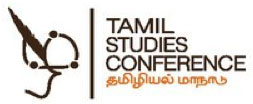 The Seventh Annual Tamil Studies Conference will be held in Toronto, Canada, 11–12 May 2012. It is being organised by the
University of Toronto the University of Windsor. The plenary speakers are Noboru Karashima, Emeritus Professor, University of Tokyo, Japan; and
A.R. Venkatachalapathy, Professor, Madras Institute for Development Studies, Chennai, India.
This conference aims to understand the means by which people come to know, feel, and reflect upon their past. Questions of history, memory, and heritage are all guided by the ethical concerns of the present and by desires regarding the future. The production of alternatives to the dominant narrative might also entail their own forms of exclusion. Contestation arises precisely when the past becomes a resource to remake the contemporary world. But how do we narrate pasts? What counts as “evidence” in such narrations? Whose stories prevail? Which pasts are silenced? Deadline for submitting abstracts is 31 August 2011.
The Seventh Annual Tamil Studies Conference will be held in Toronto, Canada, 11–12 May 2012. It is being organised by the
University of Toronto the University of Windsor. The plenary speakers are Noboru Karashima, Emeritus Professor, University of Tokyo, Japan; and
A.R. Venkatachalapathy, Professor, Madras Institute for Development Studies, Chennai, India.
This conference aims to understand the means by which people come to know, feel, and reflect upon their past. Questions of history, memory, and heritage are all guided by the ethical concerns of the present and by desires regarding the future. The production of alternatives to the dominant narrative might also entail their own forms of exclusion. Contestation arises precisely when the past becomes a resource to remake the contemporary world. But how do we narrate pasts? What counts as “evidence” in such narrations? Whose stories prevail? Which pasts are silenced? Deadline for submitting abstracts is 31 August 2011.
More information.
• ![]() Iowa conference on Politics of Religion in Asia
Iowa conference on Politics of Religion in Asia
 A
A![]() n International Conference on "Politics of Religion in Asia" will take place 12–13 May 2012 at the University of Iowa, USA, and a call for papers is now open. The conference will focus on the development of religion and its role in politics in Asian countries, among which China, Hong Kong, Japan, South Korea, Taiwan, Singapore and India. The conference organisers from the International Programs, University of Iowa will support the participants whose papers are accepted with airfare and lodging, as well as with publishing the papers in an edited volume. Deadline for s
n International Conference on "Politics of Religion in Asia" will take place 12–13 May 2012 at the University of Iowa, USA, and a call for papers is now open. The conference will focus on the development of religion and its role in politics in Asian countries, among which China, Hong Kong, Japan, South Korea, Taiwan, Singapore and India. The conference organisers from the International Programs, University of Iowa will support the participants whose papers are accepted with airfare and lodging, as well as with publishing the papers in an edited volume. Deadline for s![]() ubmitting proposals is 1 October 2011. More information (as a pdf-file).
ubmitting proposals is 1 October 2011. More information (as a pdf-file).
• Montreal conference on Textile Trades and Consumption in the Indian Ocean World
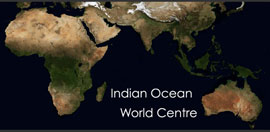 An International conference on ”Textile Trades and Consumption in the Indian Ocean World, from Early Times to the Present” will be held in Montreal, Canada, 2–4 November 2012. It is organised by the Indian Ocean World Centre (IOWC) at
McGill University. This multi-disciplinary international conference aims to bring together scholars from across the humanities and social sciences to share findings, methodologies and theoretical perspectives on cloth’s critical role in driving exchanges in the Indian Ocean World from early times to the present day. Deadline for submission of abstracts is 30 September 2011. More information.
An International conference on ”Textile Trades and Consumption in the Indian Ocean World, from Early Times to the Present” will be held in Montreal, Canada, 2–4 November 2012. It is organised by the Indian Ocean World Centre (IOWC) at
McGill University. This multi-disciplinary international conference aims to bring together scholars from across the humanities and social sciences to share findings, methodologies and theoretical perspectives on cloth’s critical role in driving exchanges in the Indian Ocean World from early times to the present day. Deadline for submission of abstracts is 30 September 2011. More information.
• 18th International Congress of Rural Health & Medicine in Goa
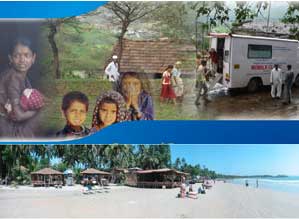 The 18th International Congress of Rural Health & Medicine will be held from 5 - 8 December 2012 at Panjim, Goa. The congress is organised by the Pravara Institute of Medical Sciences at Deemed University, Loni, India, in collaboration with the International Association for Rural Health and Medicine, Japan and the congress theme will be ”Challenges for Health in Global Villages”. The congress aims to promote a dialogue among NGOs, academics and government on global issues related to rural health in connection to the achievement of the Millenium Development Goals. Prof. Ingalill Rahm Hallberg, Assistant Vice Chancellor of Lund University (and Professor in Health Care Science), Prof. Peter Lindqvist from the Swedish Agricultural University (SLU), and Mr. Lars-Olof Lindgren, Ambassador of Sweden to India, are members of the advisory committee comprised of delegates from more than 10 countries.
The 18th International Congress of Rural Health & Medicine will be held from 5 - 8 December 2012 at Panjim, Goa. The congress is organised by the Pravara Institute of Medical Sciences at Deemed University, Loni, India, in collaboration with the International Association for Rural Health and Medicine, Japan and the congress theme will be ”Challenges for Health in Global Villages”. The congress aims to promote a dialogue among NGOs, academics and government on global issues related to rural health in connection to the achievement of the Millenium Development Goals. Prof. Ingalill Rahm Hallberg, Assistant Vice Chancellor of Lund University (and Professor in Health Care Science), Prof. Peter Lindqvist from the Swedish Agricultural University (SLU), and Mr. Lars-Olof Lindgren, Ambassador of Sweden to India, are members of the advisory committee comprised of delegates from more than 10 countries.
For the latest news about the congress check its website.
More information (as a pdf-file).
• Other conferences connected to South Asian
studies all over the World
See SASNET’s page, http://www.sasnet.lu.se/conferences.html#conf
Important lectures and seminars in Scandinavia
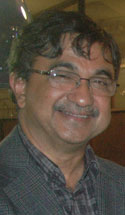 • Karlstad University seminar series on conflict resolution in South Asia
• Karlstad University seminar series on conflict resolution in South Asia
The Dept. of Religious Studies, and the Faculty of Teacher’s Training at Karlstad University organises a series of lectures with Professor Priyankar Upadhyaya from Banaras Hindu University (BHU), Varanasi, India, 31 August – 14 September 2011.
Prof. Upadhyaya who holds the UNESCO Chair for Peace at BHU, and is also
Director for the Malaviya Centre for Peace Research, will speak on different aspects concerning Peace Management and Conflict Resolution in South Asia.
– On Wednesday 31 August, 13.30–15.00, he will talk about “Peace Building in a Multicultural Society: The Banaras Experience”.
– On Wednesday 7 September, 13.30–15.00, he will talk about “Peace Education in Hinduism”.
– On Wednesday 14 September, 13.30–15.00, he will talk about “Conflict Resolution in a Globalized South Asia”.
In its entirety, the three lecture series is designed to give the audience a sound orientation in the topic. Each lecture, however, is independent. Venue for all seminars: Karlstad University, hall 3B 512. For more information, contact Associate Professor Marc Katz, Dept. of Religious Studies.
• Asian Studies Day 2011 at University of Tampere
University of Tampere in Finland organises the Asian Studies Day 2011 on Friday 2 September 2011. The goal of the event is to provide a national platform for discussions and networking in Asian studies in Finland. The event is organized jointly by the University Network for Asian Studies, the Graduate School of Contemporary Asian Studies, and the School of Management at the University of Tampere.
The programme includes a presentation by Satu Ranta-Tyrkkö, Senior Researcher, University of Tampere, entitled ”At the Intersection of Theatre at Orissa, India: Natya Chetana and Its Theatre”; and a presentation by Jukka Jouhki, Senior Researcher, University of Jyväskylä, entited ”Mobile Technology, Gender and Development in India”.
During the day, there will also be a Roundtable discussion on Asian Studies in Finland. More information.
• Lund University seminar on Missionary Narratives from South India
 Dr. Malin Gregersen, Department of History, Lund University holds a SASNET Brown Bag lunch lecture on Thursday 15 September 2011, 12–13. She will talk about ”Fostering Obligations: Swedish Medical Missionary Narratives from South India”. The seminar is open to the public, and held in Murbeckssalen, Gula Villan (inside the Botanical Gardens), Östra Vallgatan 14, Lund.
Dr. Malin Gregersen, Department of History, Lund University holds a SASNET Brown Bag lunch lecture on Thursday 15 September 2011, 12–13. She will talk about ”Fostering Obligations: Swedish Medical Missionary Narratives from South India”. The seminar is open to the public, and held in Murbeckssalen, Gula Villan (inside the Botanical Gardens), Östra Vallgatan 14, Lund.
The seminar is part of an interdisciplinary South Asia Seminar series at Lund University, introduced by SASNET in January 2011 in the form of Brown bag lunch seminars. The aim is to present and disseminate the eminent South Asia related research that is carried out in so many departments at Lund University.
SASNET offers free brown bag lunch to those who wish to have such. If so, please send an e-mail to Lars Eklund at least a day in advance. More information about the seminar series.
• Rabindranath Tagore seminars at Copenhagen, Lund, Stockholm and Uppsala
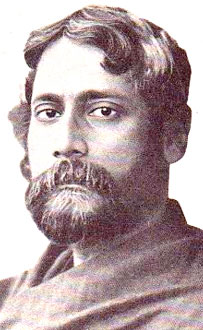 The 150th birth anniversary of great Indian/Bengali poet and Nobel Laureate Rabindranath Tagore will be celebrated in Scandinavia during the period 19–23 September 2011. Academic seminars will be held at Copenhagen University on 19th, Lund University on 21st, Stockholm University on 22nd and at Uppsala University on 23rd September.
The 150th birth anniversary of great Indian/Bengali poet and Nobel Laureate Rabindranath Tagore will be celebrated in Scandinavia during the period 19–23 September 2011. Academic seminars will be held at Copenhagen University on 19th, Lund University on 21st, Stockholm University on 22nd and at Uppsala University on 23rd September.
SASNET is strongly involved in planning for these academic seminars and related cultural programmes that are organised
in collaboration with the Indian embassies in Copenhagen and Stockholm, and with support from the Indian Council for Cultural Relations (ICCR). Invited scholars include Professor William Radice, SOAS, University of London; Dr. Reba Som, Director, ICCR Rabindranath Tagore Centre in
Kolkata; and Professor Asoke Bhattacharya, Jadavpur University, Kolkata. Detailed programmes will be posted soon.
• Information about South Asia related lectures and seminars
See SASNET's page, http://www.sasnet.lu.se/conferences.html
Business and Politics
• Swedish development cooperation praised
in OECD mid-term review
 Sweden is making significant progress in improving and streamlining development cooperation. This is the view of the OECD's Development Assistance Committee (DAC), which has conducted a mid-term review of Swedish development assistance. In the report, published on 25 July 2011, DAC states that Sweden, despite challenges resulting from ongoing reforms within the Swedish aid administration, has made significant progress in handling and implementing the recommendations of DAC's comprehensive aid review in 2009. A clearer strategic orientation, better communication and a more strategic approach to working with multilateral development organisations are some of the improvements highlighted in the mid-term review. More information.
Sweden is making significant progress in improving and streamlining development cooperation. This is the view of the OECD's Development Assistance Committee (DAC), which has conducted a mid-term review of Swedish development assistance. In the report, published on 25 July 2011, DAC states that Sweden, despite challenges resulting from ongoing reforms within the Swedish aid administration, has made significant progress in handling and implementing the recommendations of DAC's comprehensive aid review in 2009. A clearer strategic orientation, better communication and a more strategic approach to working with multilateral development organisations are some of the improvements highlighted in the mid-term review. More information.
Read the DAC mid-term review document (as a pdf-file).
• SIBC Seminar in Gothenburg with Lars-Olof Lindgren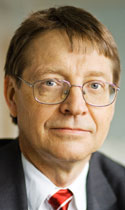
Sweden India Business Council (SIBC) organises a morning seminar with H.E. Lars-Olof Lindgren, Sweden’s Ambassador to India and Sri Lanka, on Tuesday 16 August 2011, at 08.30. The seminar is co-organised by the Swedish Trade Council and Business Region Göteborg (with University of Gothenburg and Chalmers Institute of Technology being partners), and will be held in Swedish. Ambassador Lindgren, who has a degree from the Stockholm School of Economics, has been invited to give his and possibly a Swedish perspective on India. Venue: Business Region Göteborg Norra Hamngatan 14, Gothenburg.
More information.
• Information about South Asia related business and politics in Sweden
See SASNET's page, http://www.sasnet.lu.se/polbuss.html
South Asia related culture in Scandinavia
• Information about South Asia related culture
in Sweden/ Scandinavia
See SASNET’s page, http://www.sasnet.lu.se/culture.html
New and updated items on SASNET web site
• Swedish departments where research on
South Asia is going on:
Constantly added to the list of research environments at Swedish
universities, presented by SASNET. The full list now includes more than 280 departments,
with detailed descriptions of the South Asia related research and education
taking place!
Go to http://www.sasnet.lu.se/environment.html
Now added–
ƒ Programme in Medicine/Global Health (Läkarprogrammet), Sahlgrenska Academy, University of Gothenburg
ƒ Swedish Collegium for Advanced Study (SCAS), Uppsala
Best regards
Lars Eklund
Deputy director/webmaster
SASNET/Swedish South Asian Studies Network
SASNET is a national network for research, education, and information about South Asia and is based at Lund University. Its aim is to promote a dynamic networking process in which Swedish researchers cooperate with their counterparts in South Asia and around the globe.
The SASNET network is open to all branches of the natural and social sciences. Priority is given to interdisciplinary cooperation across faculties, and more particularly to institutions in the Nordic countries and South Asia. SASNET believes that South Asian studies will be most fruitfully pursued as a cooperative endeavour among researchers in different institutions who have a solid base in their mother disciplines.
The network is financed by Lund University.Postal address: SASNET – Swedish South Asian Studies Network, Scheelevägen 15 D, SE-223 70 Lund, Sweden
Visiting address: Ideon Research Park, House Alpha 1 (first floor, room no. 2040), in the premises of the Centre for East and South East Asian Studies at Lund University (ACE).
Phone: + 46 46 222 73 40
Fax: + 46 46 222 30 41
E-mail: sasnet@sasnet.lu.se
Web site: http://www.sasnet.lu.se
SASNET - Swedish South Asian Studies Network/Lund
University
Address: Scheelevägen 15 D, SE-223 70 Lund, Sweden
Phone: +46 46 222 73 40
Webmaster: Lars Eklund
Last updated
2011-08-26
